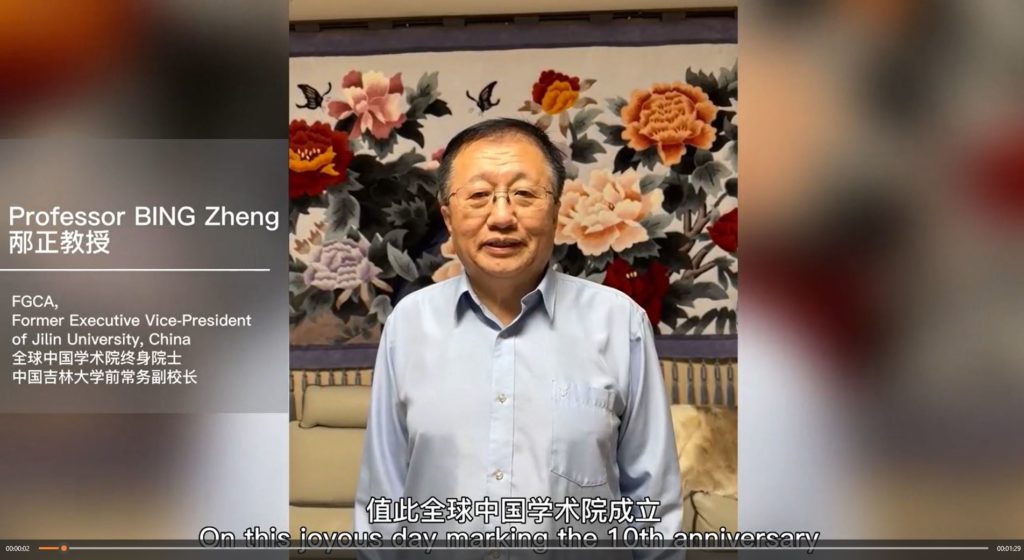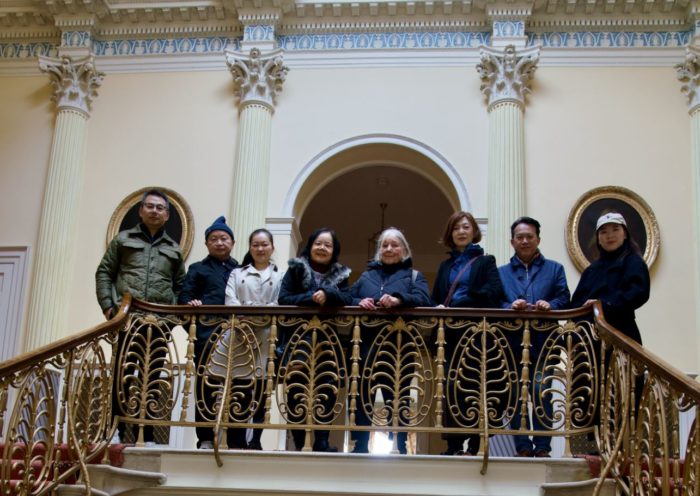
全球中国学术院两天团建活动: 融合学术洞察与文化、历史及自然探索
在紧张的筹备和成功地举办了第八届全球中国对话和全球中国学术院10年院庆的活动后,我们决定将团队建设活动安排在2024年2月初进行。我们团队由以下成员组成:常向群(全球中国学术院院长),方宏(法律顾问),郑凯蒂(行政经理),刘大卫(后勤经理),李黎和沈曦(第八届全球中国对话志愿者)。
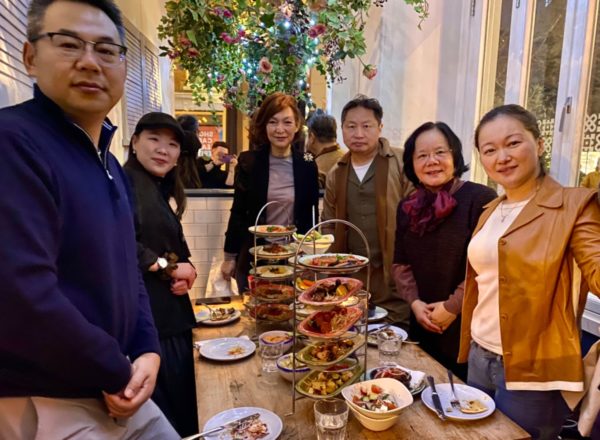
两天团建活动的第一天安排在2月3日,在通常是人们期待着中国新年庆典的时候。然而,我们六人的团队跳出了常规,选择了考文特花园的“真正的希腊”The Real Greek进行美食探索。餐厅内摆饰着精致的花朵,增添了一抹与中国庆典中大胆的红色和金色截然不同的希腊美学。那里的氛围明显带着地中海特色,与中国新年特有的灯笼和红色装饰形成了新鲜的对比。食物被呈现在分层的托盘上,这种色彩鲜艳的菜肴摆放方式与通常放在桌中央供大家共享的中国聚餐风格形成了对比。
我们点了希腊扁面包和生蔬菜拼盘,还有包括黄色法瓦豆泥、鹰嘴豆泥、酸奶黄瓜酱、辣味羊奶酪蘸酱(Htipiti)、茄子沙拉、鸡肉串、路卡尼科牛猪混合肉肠串、猪肉串、哈洛米奶酪与蔬菜串、羊肉丸子、菠菜巨豆、炸豆丸子、烤茄子、素食肉丸子等多样的菜肴,以及地中海米饭、爱琴海卷心菜、薯条、波尔戈里小麦、新土豆和希腊沙拉等共享的配菜。甜点方面,我们共享了巴克拉瓦、橙香蛋糕和带核桃糖浆的希腊酸奶。
这些菜肴的味道丰富多样,从清爽的酸奶黄瓜酱到微辣的羊奶芝士酱,每一口都充满了惊喜。烤茄子的烟熏味与中国菜中常见的甜辣味形成了对比,而炸豆丸以其外脆内软的质感和深沉的香料味道,呈现了与中国传统炸春卷完全不同的风味。它们的各种烤串,包括鸡肉串、混合肉肠串、猪肉串和哈洛米奶酪与蔬菜串,类似于中国的羊肉串、烤鱼串、牛肉串等相似,都是将肉类或其他食材串在竹签或铁签上进行烤制。不同的是,希腊烤串在口味上更加注重香草和橄榄油的使用,而中国烧烤则更偏爱使用孜然和辣椒等调料来增加风味。地中海米饭和希腊沙拉带来了清新的口感,与我们熟悉的中国米饭和拌菜形成了鲜明的对比。巴克拉瓦的甜蜜和橙香蛋糕的柔软绵密,都是对中国节日甜食的美妙补充。
通过这些不同的口味和风格,我们的团队不仅享受到了希腊美食的独特魅力,也加深了对中西餐饮文化差异的理解和欣赏。这次视觉和美食之旅不仅为我们为第八届全球中国对话和全球中国学术院10年院庆的辛勤工作提供了必要的休息,而且还起到了文化桥梁的作用,将我们的团队与世界的多样传统相连。共享的希腊扁面包和生蔬菜拼盘,多样的蘸酱和烤串,以及各种配菜和甜点,提供了一种共同的体验,虽然在呈现上不同,但反映了中国餐饮传统中的集体欢乐。这次体验既是一次文化的沉浸,也证明了食物在将人们聚集在一起时的普遍语言。
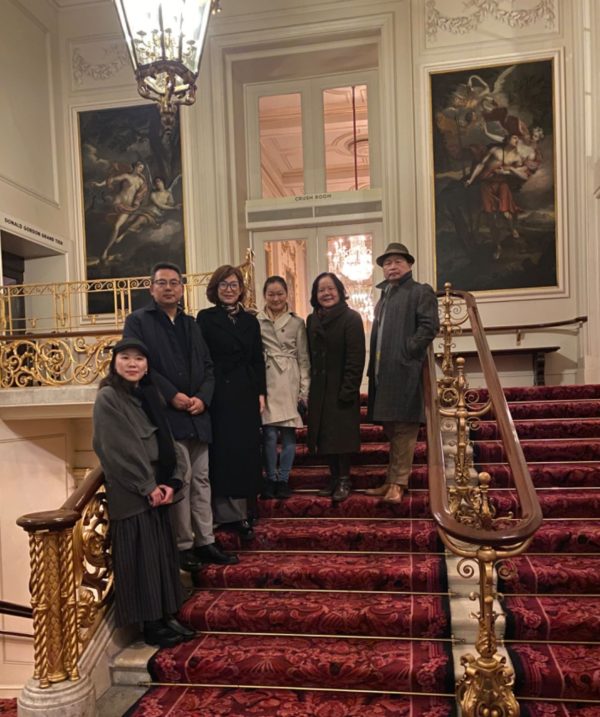
在享受了希腊晚宴后,我们团队来到了皇家歌剧院观看芭蕾舞剧《曼侬》。皇家歌剧院位于伦敦考文特花园,是世界领先的歌剧院之一,以其卓越的歌剧和芭蕾表演而闻名。它是皇家歌剧、皇家芭蕾舞团和皇家歌剧院管弦乐团的所在地。建筑本身是维多利亚时代建筑的杰作,拥有宏伟的观众厅、豪华的公共空间和先进的舞台设施。其历史可以追溯到18世纪,使其成为英国的历史地标和文化图标。《曼侬》是由肯尼思·麦克米伦创作的三幕芭蕾舞剧,音乐由朱尔斯·马斯奈作曲。它首次由伦敦皇家芭蕾舞团于1974年上演。芭蕾舞剧基于阿贝·普雷沃1731年的小说《德·格里厄和曼侬·莱斯科的故事》。讲述了年轻而天真的曼侬爱上了骑士德·格里厄,但被她的兄弟说服离开他去追求更富有的GM先生。这部芭蕾以其表现力的编舞、情感深度和美妙的音乐而闻名,展示了舞者的才能和技术技巧。《曼侬》芭蕾舞剧和皇家歌剧院代表了西方古典表演艺术的巅峰,专注于通过舞蹈、音乐和布景设计讲述故事。
相比之下,中国在传统表演艺术领域的等价物可以认为是京剧或昆曲。京剧和昆曲体现了东方表演艺术传统的精髓,强调歌唱表演、诗意对白和象征性手势。主要区别在于用于传达故事和情感的文化表达和艺术媒介。像《曼侬》这样的西方芭蕾通常使用舞蹈的通用语言来叙述故事,而中国戏剧则采用更综合的方法,结合唱歌、表演和武术来表达复杂的叙事和角色。然而,两者都提供了对各自文化和传统的深刻见解,展示了通过表演艺术讲述故事的普遍吸引力。京剧是最著名的传统中国戏剧艺术之一,以其独特的歌曲、对白和编码的动作序列(包括手势、移动、打斗和杂技)的组合而闻名。它以精美的服装、化妆和表演者的独特声音风格而知名。昆曲被认为是中国最古老的戏曲形式之一,以其优雅的动作、精致的音乐和文学精湛而著称。这两种中国戏曲都有深厚的历史根源,并且在中国的文化遗产中扮演着重要角色,与西方文化中的芭蕾和歌剧类似。
在皇家歌剧院欣赏了《曼侬》芭蕾舞剧后,我们深深地感受到了欣赏和情感上的冲击。在这个古典艺术最负盛名的场馆之一所呈现的表演,是一次难忘的体验,与我们产生了深深的共鸣。舞者精湛的技巧,加上激动人心的音乐和关于爱与悲剧的动人叙事,将我们带入了曼侬和德·格里厄的世界,让我们亲身体验到了他们的快乐、爱恋和绝望。编舞将古典芭蕾与表现力丰富的戏剧动作相结合,捕捉了角色复杂情感和故事戏剧性转折的精髓。皇家歌剧院的宏伟和制作的华丽服装及布景为晚上增添了额外的魅力层次,让我们感觉仿佛是舞台上所描绘的奢华世界的一部分。
这次体验不仅是艺术上的享受,也是文化上的充实,提醒我们表演艺术有能力唤起深层感情并与观众进行深刻的连接。当我们离开歌剧院时,我们对表演者和创意团队所展现的才能和辛勤工作感到敬畏,同时也因芭蕾悲剧性的结局而留下了挥之不去的忧郁。然而,最重要的是,我们感到感激有机会见证如此精湛的芭蕾展示,它不仅娱乐了我们,也在情感上触动了我们,留下了对我们的心灵和思想的持久印象。
第二天,2月4日,我们的团队参观了布洛克特庄园。我们有幸与历史学家和汉学家吴芳思Frances Wood博士同行,她曾是大英图书馆中文部主任,也是全球中国学术院的信托人,还有剑桥大学菲茨威廉博物馆亚洲艺术藏品的负责人詹姆斯·林博士。在他们的知识和见解的指导下,我们走访了庄园内的几乎每一个房间,仔细观察了家具、绘画和各种收藏品。之后,我们穿过绿意盎然的田野,沿着湖泊和桥梁旁的树木漫步。
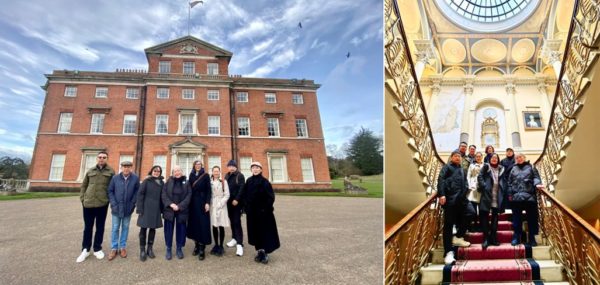
布洛克特庄园位于英格兰赫特福德郡,是一座具有数个世纪历史的经典英式乡村大宅。布洛克特庄园的建筑是帕拉第奥风格的优秀范例,其特点是对称、古典形式和宏伟规模。庄园内部同样令人印象深刻,精心装饰的房间反映了那个时代的优雅和奢华。这座壮丽的庄园曾是两位英国首相,墨尔本勋爵和帕默斯顿勋爵的居所,使其成为具有重要历史和政治意义的地点。我们探访了几乎每个房间,如维多利亚女皇的卧室,墨尔本勋爵、 墨尔本勋爵夫人,帕默斯顿勋爵、墨尔本勋爵夫人等卧室,每个房间都讲述着过去居住者及其时代的故事。布洛克特庄园以其惊人的建筑、广阔的庄园以及在英国社会和政治历史中的角色而闻名。
帕默斯顿勋爵在第一次鸦片战争期间担任英国首相,是当时的外交大臣,对启动和管理这场冲突起到了重要作用。他支持使用武力来保护英国的鸦片贸易利益,主张对中国采取强硬立场,导致了冲突的爆发。战争以中国的失败和《南京条约》的签订而结束,条约迫使中国割让香港给英国,并开放多个通商口岸,对中国产生了长期的负面影响。帕默斯顿的政策虽然扩展了英国的全球影响力,但也标志着中国近代史上一段屈辱的开始,对中国和世界历史产生了深远的影响。
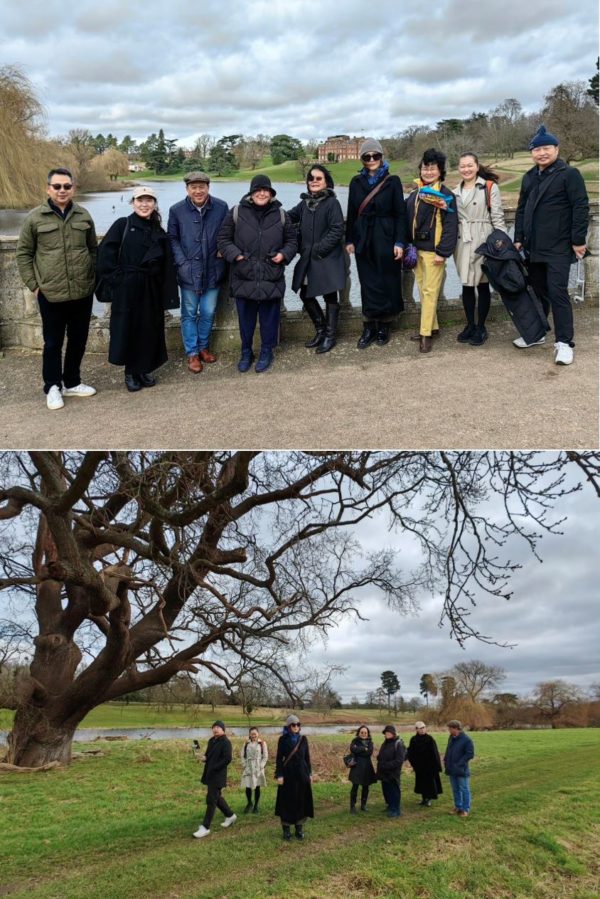
庄园的花园是英国园林传统的证明,拥有广阔的田野、整齐修剪的草坪和成熟的树木,所有这些都以风景如画的湖泊和桥梁为背景。这一景观提供了宁静而田园诗般的环境,在这里可以享受悠闲的散步和英国乡村的自然美景。这片区域后来成为了以墨尔本勋爵和帕默斯顿勋爵这两位英国首相命名的两个高尔夫球场。
布洛克特庄园的园艺和历史可以与中国的古典庄园相比较,这些庄园通常根据风水原则设计,以和谐地融合建筑、园林和水元素。与布洛克特庄园相似,这些庄园曾是高级官员的居住地,是文化和政治活动的中心。中国的古典园林,如苏州的园林,因其错综复杂的设计而著名,包括亭台、池塘、假山和精心布置的植物,创造出反映传统中国文化哲学和美学理念的宁静景观。
布洛克特庄园体现了英国乡村庄园的遗产,象征着政治历史和建筑之美,而中国的古典庄园则展现了人与自然和谐相处的东方哲学,展示了园林设计的艺术和室内外空间的整合。这两种传统为我们提供了了解各自文化的窗口,强调了历史、自然和建筑在塑造这些非凡庄园的身份和遗产中的重要性。
在参观布洛克特庄园的过程中,我们深刻感受到了英国历史的厚重以及这些历史人物和地点在世界历史中的重要地位。通过吴芳思博士和詹姆斯·林博士的介绍,我们不仅对庄园的历史和建筑风格有了更加深刻的了解,还对帕默斯顿勋爵在第一次鸦片战争中的作用及其对中英关系影响有了更全面的认识。这次游历不仅是一次视觉和知识上的享受,也是一次对过去事件深层次反思和理解的机会。
庄园的自然美景和宁静氛围让我们暂时远离了现代生活的喧嚣,仿佛穿越回了那个充满历史故事的时代。在广阔的田野和湖泊旁漫步时,我们不禁思考历史的进程以及它如何塑造今天的世界。
通过这次访问,我们不仅增长了见识,也加深了对中英两国历史交流复杂性的理解。这种跨文化的学习和交流是非常宝贵的,它不仅让我们更加珍视自己的文化遗产,也促使我们对其他文化保持开放和尊重的态度。布洛克特庄园之行是一次难忘的经历,它让我们对历史的力量和美丽的自然景观有了新的认识和感悟。

最后,我们团队在附近的中餐馆“真正的中国”(The Real China)享用了自助餐,大家注意到了一个有趣的现象:尽管餐馆名字听起来很中式,里面主要是中餐,我们却找不到它的中文名字,同时注意到所有工作人员都是印度人, 据说餐馆的老板是华人。这个意外的发现为我们的体验增添了多元文化的丰富性。它提醒我们料理和文化的全球性,食物怎样能够超越地理和文化的界限,将不同的人聚集在一起。
我们的团建活动从一个名为“Real Greek”(真正的希腊)餐馆开始,最后在一个名为“Real China”(真正的中国)的餐馆结束,这种安排的巧合有几种有趣的含义或象征意义,为团建活动平添了耐人寻味的寓意,如:
- 文化多样性和包容性:从一个希腊餐馆到一个中国餐馆,这样的行程展示了对不同文化的尊重和欣赏(“美人之美”,费孝通语)。这可能意味着我们团队或组织注重多样性和包容性,愿意探索和庆祝不同的文化传统。
- 从西到东的旅程:从地理文化的角度看,希腊常被视为西方文明的摇篮,而中国则是东方文化的代表。这种从“Real Greek”到“Real China”的安排可能象征着一次从西方到东方的文化之旅,反映了对全球文化遗产的广泛探索(与《西游记》反向的迷你“东游记”)。
- 探索和连接:通过在两个不同但同样“真实”的文化场所开始和结束我们的活动,这可能意味着我们的团队重视深入探索和建立跨文化的连接。这种体验可能鼓励团队成员开放思维,学习并欣赏不同的生活方式和传统(还是“美人之美”)。
- 味觉之旅:从美食的角度来看,这种安排提供了一次从希腊菜到中国菜的味觉之旅。这不仅让团队成员能够享受到多样化的美食体验,也可能象征着团队愿意尝试新事物,勇于探索未知领域(进一步的“美人之美”)。
- 象征性的开始和结束:以“Real Greek”开始,以“Real China”结束,可能还有其象征性的意义,如从某个文化的启示开始,到另一个文化的智慧结束,代表了一次完整的成长或学习周期(达致“美美与共”,费孝通语)。
总之,在两天的丰富团建活动后,我们的团队不仅彼此间感觉更加亲密,而且对广阔的全球文化感觉更加连结。我们访问“真正的希腊”和“真正的中国”期间品尝的美味佳肴为我们的探索画上了完美的句号,加深了我们对历史和文化的理解,增强了团队间的友谊和满足感。这些共享的经历无疑让我们更加紧密地团结在一起,丰富了我们的集体记忆,并培养了我们对所探索的多元文化遗产的更大欣赏。访问“真正的中国”强调了转文化”Transculturality”的美丽以及以意想不到的方式遇见和欣赏世界多样性的可能性。
注:后来我们认识了Real China老板娘,了解到疫情以后餐厅根据客源和员工变化做的一些改革。以下引自我们的第六条徒步-聊天-吃喝路线的内容 ( https://globalchinaacademy.org/six-walk-talk-routes-tea-lunch-gca-centre).
位于哈特菲尔德的盖勒里亚奥特莱斯购物中心的真正的中国餐厅是英国的一个东方自助餐连锁餐厅。它提供超过 50 种现制特色菜,从四川菜、中餐、粤菜到寿司等。餐厅和酒吧的现代化和当代设计营造了一个适合与家人和朋友一起用餐和享受鸡尾酒的绝佳环境。近年来,他们进行了一些改革:
- 顾客和员工的健康安全是最重要的。餐厅空间已经过培训和重新设计,以符合当前的健康和安全要求。
- 他们对引入新的“桌面服务自助餐”感到兴奋,顾客可以通过扫描 QR 码无接触点餐,食物将直接送到桌上。
- 全新的扩展菜单提供更多选择,每道菜都是现做的,同时保持传统的中式自助餐体验,允许无限量点餐。
- 最重要的是,它创建了一个既有自助餐也有单点菜单的“混合餐厅”。
其他相关活动
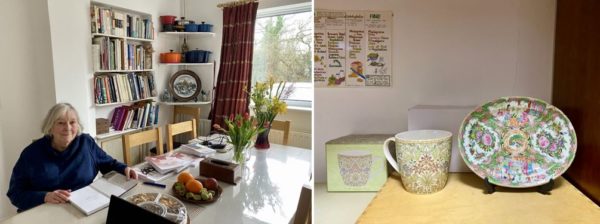
左边的照片是2月10日拍摄的,那天是春节,吴芳思博士与常向群教授一起享受了学术院中心的“徒步与聊天”的第四条路线。之后,吴博士为常教授签署了一本她的书《被背叛的盟友:第一次世界大战中的中国》。桌上,李黎院士2月4日从剑桥带来的多样化的花(桌子尽头)还绽放着,傍边加上了这次吴博士带来的一种百合花,形成了一种对照。巧合的是,吴博士还带来了一个带有威廉·莫里斯设计的精美中国瓷杯。莫里斯是19世纪英国工艺美术运动的代表人物,他是一位纺织品设计师、诗人、艺术家、作家和社会主义活动家。这与李黎曾经捐赠给学术院的一个广彩盘又形成了一种对比。
右边的照片显示了在学术院中心展出的杯子和盘子。两者都是装饰艺术的杰作,各自承载着其文化和历史的独特性。杯子的颜色相对柔和,以绿色和黄色为主,辅以精致的花卉图案。相比之下,广彩盘则更加鲜艳,使用了多种颜色,包括粉红色、绿色、黄色和蓝色。威廉·莫里斯的设计通常代表了19世纪晚期英国工艺美术运动的风格,特点是复杂的自然图案、对称性和重复的植物纹样。广彩盘反映了广东省十三行时期的艺术风格,以其丰富的颜色、复杂的风景和对称的装饰而闻名。杯子可能是工业图案印刷的产品,而广彩盘的制作则可能更为复杂,涉及多次烧制和手工绘画。杯子是日常饮用液体的物品;广彩盘则更可能是装饰品或用于特殊场合的器皿。威廉·莫里斯的设计反映了19世纪晚期英国的社会文化背景,强调工艺和反工业化。广彩盘则反映了十三行时期广东省的贸易繁荣和文化交流。
常向群,2024年2月12日首发;3月10日更新
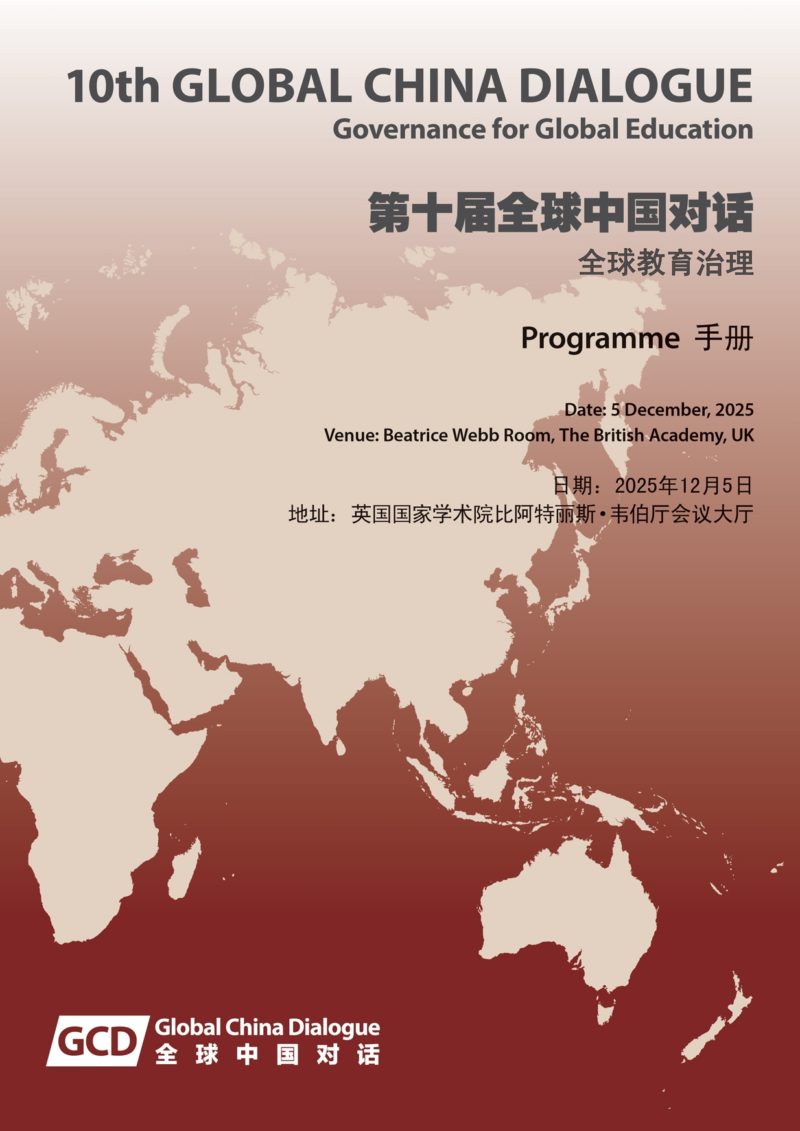
第十届全球中国对话——全球教育治理
第十届全球中国对话论坛会议通知
时间:2025年12月5日8:30-17:00 地点:英国国家学术院 (The British Academy)
继九届全球中国对话(Global China Dialogue, GCD)论坛的成功举办之后,第十届全球中国对话:“全球教育治理”将于2025年12月5日(星期五)在英国国家学术院(British Academy)举行。本届对话将聚焦如何通过政策协同、国际合作、公平保障、质量提升与制度创新,推动全球教育的可持续发展。
教育作为实现社会公正、促进全球共同繁荣、应对未来变革的重要基石,日益依赖跨国合作、多方参与与科技赋能。尤其是在人工智能、大数据等新兴技术深刻重塑教育模式与学习生态的背景下,全球教育治理正面临前所未有的机遇与挑战。
本届对话将搭建一个多元交流的平台,汇聚政策制定者、学者、教育工作者、企业代表和国际组织,共同探讨全球教育治理的新理念、新机制与新路径。
本届对话主办单位:
- 英国全球中国学术院
- 英国英国埃克塞特大学人文、艺术和社会科学学部
- 英国兰卡斯特大学ESRC语料库社科研究中心
- 中国北师香港浸会大学中华文化传播研究院
本届对话组委会
主席
- 托尼·麦肯勒里 Tony McEnery 教授,英国社科院院士及理事会理事,英国皇家艺术院院士;兰开斯特大学语言学和英语语言学系杰出教授;全球中国学术院理事会主席及创院院士
- 常向群教授,英国皇家艺术院院士;全球中国学术院院长及创院院士;伦敦大学学院荣誉教授(2015-20),中国南开大学特聘教授
- 李利教授,英国埃克塞特大学协理副校长(全球事务),人文、艺术与社会科学学部教授;中英人文高等教育联盟(UCHAHE)英方副秘书长
- 黄煜教授,北师香港浸会大学 (BNBU) 协理副校长,中华文化传播研究院常务副院长
秘书长
- 李伯一教授,南京财经大学工商管理学院教授;全球中国学术院中方理事会秘书及副院士
- 梁凯先生,全球中国学术院项目专员;英国 MEL Scholar 联合创始人;英国 MELScience 商务总监
本届对话包括以下四个版块:
- 治理模式创新与技术赋能:本板块探讨多方协作、公私合作(PPP)以及人工智能、大数据、在线教育和开放教育资源等技术在教育治理中的应用。终身学习与技能培训已成为应对未来挑战、提升教育韧性的关键。
- 教育公平、包容与质量保障:本板块聚焦教育权利保护、科研诚信与学术伦理建设,并通过国际评估、认证标准和教师培训提升教育质量。公平与质量始终是教育治理的核心目标,开放科学与透明评估体系为其提供有力支撑。
- 全球教育政策与国际合作:本板块涵盖全球性与区域性政策框架、国际组织在协调合作中的作用,以及通过大学联盟、学位互认和数字平台开展的跨国合作。当前教育政策日益依赖多层次、跨国界的协作机制,国际组织和全球网络共同促进教育资源的共享与互联。
- 教育融资与可持续发展:本板块关注全球教育融资机制、国际教育援助,以及教育与科技、产业的深度融合。充足与公平的资金支持是实现教育目标的保障,创新与跨界合作为包容性增长和共同繁荣注入强劲动力。
通过多元视角和跨界对话,第十届全球中国对话旨在为全球教育治理贡献中国智慧与国际经验,携手构建一个更加公平、优质、包容和可持续的全球教育生态。
第十届全球中国对话(GCD X)重要日期:
- 2025年8月31日:提交议题摘要的截止日期 https://globalchinaacademy.org/abstract-submission-form/
- 2025年11月8日:发言人提交发言稿和PPT的截止日期
- 2025年11月11日:注册的最终截止日期
- 2025年11月25日:会议手册提供下载(英文版、中文版及双语版)
- 2025年12月5日:第十届全球中国对话举行日期
- GCD X 的会议文集将于 2026年 出版,内容包括会议实录、中英文翻译及编辑整理。
我们诚邀来自不同学科、领域和地区的投稿,深入探讨技术与社会转型时代全球教育治理所面临的挑战与机遇。
同时,我们也欢迎机构单位根据我们的《合作单位指南》参与本次对话,担任联合主办、协办、支持或赞助单位。
- 联系人:梁凯
- 邮箱:dialogue@gca-uk.org 或 info@globalchinaacademy.org
请点击以下链接进行相关操作:
10th GCD (GCD10) – Governance for Global Education
Call for Papers
Following nine successful Global China Dialogue (GCD) Forums, the 10th GCD (GCD10) – ‘Governance for Global Education’ – will be held at the British Academy on Friday, 5 December 2025.
GCD10 will focus on how to promote sustainable development in education worldwide through policy coordination, international cooperation, equity assurance, quality improvement, and institutional innovation. As a vital foundation for achieving social justice, fostering global prosperity, and addressing future transformations, education increasingly relies on cross-border collaboration, multi-stakeholder engagement, and technological empowerment.
In particular, with the profound impact of emerging technologies such as Artificial Intelligence (AI) and big data reshaping educational models and learning ecosystems, global education governance faces both unprecedented opportunities and challenges. This Dialogue will provide a platform for diverse conversations, bringing together policymakers, scholars, educators, business leaders, and representatives from international organizations to explore new ideas, mechanisms, and pathways for global education governance.
Organizers
- Global China Academy, UK
- Faculty of Humanities, Arts, and Social Sciences, University of Exeter, UK
- ESRC Centre for Corpus Approaches to Social Science, Lancaster University, UK
- TBC, China
Organizing committee
Chairs
- Professor Tony McEnery FAcSS FRSA, Distinguished Professor of English Language and Linguistics at Lancaster University; Council Member of Academy of Social Sciences; Chair of Global China Academy Council and Founding Fellow
- Professor Xiangqun Chang FRSA, President of Global China Academy and Founding Fellow; Honorary Professor of University College London (2015-20); Distinguished Professor of Nankai University of China
- Professor Li Li is Associate Pro-Vice-Chancellor for Global Engagement in the Faculty of Humanities, Arts, and Social Sciences (HASS), University of Exeter, UK
- TBC, China
General Secretaries
- Professor LI Boyi, Secretary and Event Officer of Chinese Council at Global China Academy, UK; School of Business Administration, Nanjing University of Finance and Economics, China
- Mr Kai Liang, Event Officer, Global China Academy, UK; Director of Business Development of MEL Science; Event Officer, Global China Academy, UK
GCD X includes the following four panels
- Panel 1: Global Education Policy and International Cooperation: this section covers global and regional policy frameworks, the coordination roles of international organizations, and cross-border cooperation through university alliances, degree recognition, and digital platforms. Education policy today relies on multi-level collaboration beyond national boundaries, with international organizations and global networks promoting the sharing of educational resources.
- Panel 2: Educational Equity, Inclusion, and Quality Assurance: this section focuses on protecting educational rights, promoting research integrity and academic ethics, and improving quality through global assessments, certification, and teacher training. Equity and quality remain central to education governance, supported by open science and transparent evaluation systems.
- Panel 3: Governance Innovation and Technological Empowerment: This section explores multi-stakeholder collaboration, public-private partnerships, and the use of AI, big data, online education, and open resources to reshape educational models. Lifelong learning and skills development are vital to meeting future challenges.
- Panel 4: Education Financing and Sustainable Development: this section highlights global financing mechanisms, international aid, and the integration of education with technology and industry. Fair and sufficient funding supports education goals, while innovation and cross-sector collaboration drive inclusive growth and shared prosperity.
Through diverse perspectives and cross-sector dialogue, the 10th Global China Dialogue aims to contribute both Chinese insights and international experience to global education governance, working together to build a fairer, higher-quality, more inclusive, and sustainable global education ecosystem.
Important Dates for GCD X
- 31st July 2024: Deadline for submitting abstracts for proposed topics. https://globalchinaacademy.org/abstract-submission-form/
- 1st November 2024: Deadline for interested parties to submit an abstract.
- 8th November 2024: Deadline for speakers to submit their notes and PowerPoint presentations.
- 11th November 2024: Final deadline for registration.
- 25th November 2024: Programme available for download in English, Chinese, and dual-language formats.
- 29th November 2024: Date of the 9th Global China Dialogue.
The proceedings of GCD IX will be published in 2025, featuring transcribed records, bilingual translation, and editing. This landmark event promises to be a pivotal platform for discussing the future of AI in global governance and its broader societal implications.
We also welcome institutional partners to join this Dialogue as co-organisers, associate co-organisers, supporters, or sponsors, in accordance with our Guidelines for Partner Institutions.
Contac: Kai Liang
Emails:dialogue@gca-uk.org or info@globalchinaacademy.org
More info
- Submit your abstract
- Call for Papers (Chinese)
- GCD9 basic info
- GCD9 basic info (Chinese)
- GCD9 Registration
- GCD9 Homepage
- GCD9 Homepage (Chinese)
- GCD series Homepage
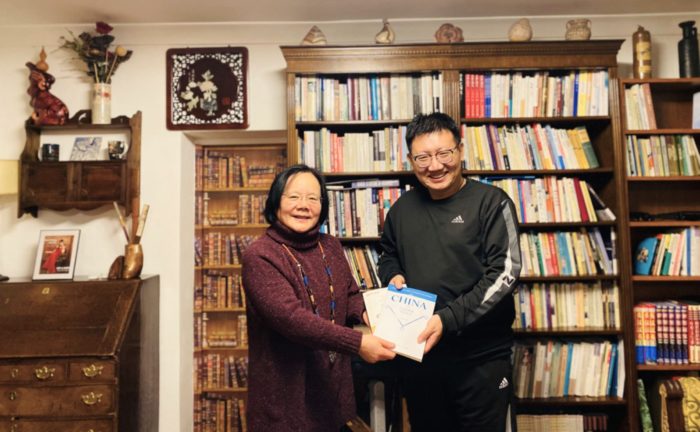
Professor Zhao Kejin visits GCA with the last wish of LI Qiang, former Chinese chairman of the Global China Academy Council (20 Jan. 2024)
On January 5, 2024, Professor ZHAO Kejin, Deputy Dean of the School of Social Sciences at Tsinghua University, contacted me to inform me that he would be visiting the UK in two weeks, with a meeting scheduled for January 20. Coincidentally, Professor FANG Lili, Distinguished Chief Professor at Southeast University, planned to bring a few copies of her book, Fei Xiaotong’s Inquiry: How Human Society Can Achieve ‘Beauty in Diversity and Shared Harmony’ (《费孝通之问:人类社会如何走向“美美与共”》Beijing: Commercial Press, 2021), to the UK as a gift for me and the academy.
Professor Fang was the last postdoctoral researcher supervised by the renowned Chinese anthropologist and sociologist Fei Xiaotong (1910-2005) at Peking University. During our visit to the United States in 2019, she summarized her understanding of Fei Xiaotong’s thoughts to me: In his early years, Fei was primarily concerned with ecological issues (the relationship between people and the land) and how China could achieve modernization. In his later years, he focused more on the issue of ‘mentality’ (人心, the relationship between people), considering how mutual understanding between individuals, as well as harmony between ethnic groups and nations, could lead to a world beyond the divisions of civilization and barbarism, or East and West, toward achieving ‘beauty in diversity and shared harmony’ in human society. [Note 1]
The above contact occurred just three weeks after Professor LI Qiang (1950-2023) passed away. LI Qiang served as Dean of the School of Social Sciences and Humanities at Tsinghua University and was the Founding Dean of the School of Social Sciences (two terms). He was also the Honorary Chinese President of the Global China Institute and the Chinese Chair of the Global China Academy Council. Recommended by Professor LI Qiang, Professor ZHAO Kejin traveled to London to participate in the 6th Global China Dialogue: Governance for World Peace at the British Academy and participated online in the 7th Global China Dialogue: Reforming Global Governance in 2021. Professor ZHAO Kejin’s visit in summer holds significant meaning for the academy, symbolizing a continuation and development of past efforts.
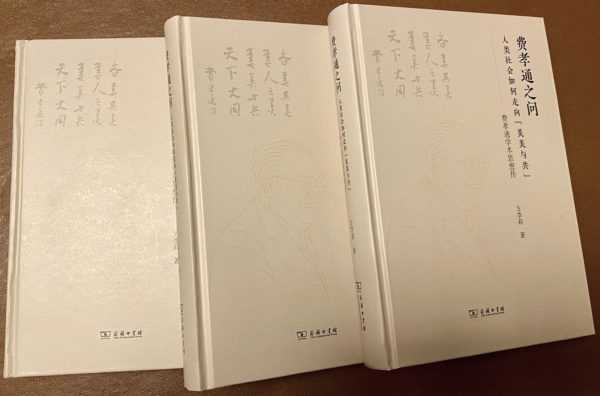
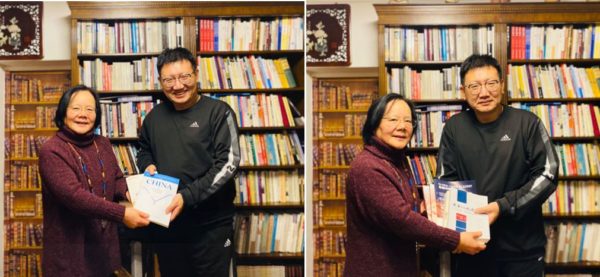
During his visit to the UK, Professor Zhao brought FANG Lili’s book on Fei Xiaotong’s thoughts, along with his own book China & Global Peace (Gale Asia, 2020) and other titles. I, in turn, presented ZHAO Kejin with my book Guanxi or Li shang wanglai?: Reciprocity, Social Support Networks, and Social Creativity in a Chinese Village (Chinese edition, Liaoning People’s Publishing House, 2009), as well as the Global China Academy leaflets and the brochure for the 7th Global China Dialogue.
Later, Zhao Kejin told me that Professor LI Qiang had left a will asking them to maintain the relationship with the Global China Academy (GCA). From ZHAO Kejin’s different expressions in the above photos, it might suggest that we discussed a serious topic. ZHAO Kejin proposed visiting the UK in the summer and mentioned that he might bring a delegation from Tsinghua University, possibly with delegations from other universities in China. For the Global China Academy, which serves as a platform to promote academic exchange between China and the world, this would undoubtedly be a great opportunity.


For dinner, I prepared a Western-style meal for Professor ZHAO Kejin and his PhD student ZHAO Danyang [Note 2].
- Starter: The pumpkin soup is a French-style dish, mainly enjoyed during the autumn and winter seasons. Although this soup appears simple, nutritious, and delicious, it was not easy for someone like me, who is not skilled in cooking, to make. First, the pumpkin needs to be peeled, deseeded, and cut into small pieces. These are then sautéed with onions, garlic, and other ingredients before adding broth and seasoning, and cooking until soft. After cooking, the soup is strained, and cream is added for a smoother texture. The soup is garnished with a dollop of yogurt and mint leaves, whose fresh flavor adds a refreshing touch to the rich pumpkin soup, enhancing its layers of taste.
- Main Course (Large Plate): Cheeseburger Loaded Fries. This dish is typical of American fast food, combining classic burger elements such as beef mince, cheese, tomatoes, onions, and burger sauce, which are layered over fries (instead of being placed between two buns), creating a dish that is rich, flavourful, and low in carbohydrates.
- Main Course (Medium Plate): Creamy Double Mushroom Penne is a classic Italian pasta dish. The combination of creamy sauce and two different types of mushrooms provide a rich taste and flavour, with the addition of cheese further enhancing the aroma and texture of the dish. However, to reduce carbohydrate intake, this dish was served not with penne but with a Mediterranean-style salad.
- Dessert: Fruit platter + snacks (details omitted).
Professor Zhao and Danyang appreciated the meal (photos provided by ZHAO Danyang). Our ‘International Cuisine’ concept and its practice, as reflected in this dinner experience, can be seen as an embodiment of Fei Xiaotong’s concept of ‘beauty in each culture appreciating the beauty of others’ (learning to appreciate different lifestyles and traditions) in everyday life, with the hope of achieving an understanding of ‘shared beauty in harmony’.
Note:
- Without a doubt, Fang Lili’s summary contributes to the understanding of Fei Xiaotong’s thoughts. However, from the corpus of The Complete Works of Fei Xiaotong, it can be observed that the term ‘ecology’ is mentioned a total of 304 times, all of which appear after Volume 8 (1957); the term ‘cultural ecology’ is mentioned 61 times, mainly between Volumes 10 and 15 (1983-1996). The term ‘human mind’ (人心) is mentioned 43 times, appearing in various volumes after Volume 3 (1942); ’mentality‘ (心态) is mentioned 113 times, in Volumes 14-17 (1992-2004). The term ‘people-to-people’ is mentioned 116 times, with references in every volume starting from the first, with as many as 23 mentions in Volume 16 (1997-1999). The term ‘nation-to-nation’ is mentioned 9 times, appearing in Volumes 8-9 and 13-17, while ‘country-to-country’ is mentioned 6 times, in Volumes 13, 16, and 17. Volumes 16-17 collect Fei Xiaotong’s works from 1996 until his death. If we consider Fei Xiaotong’s later years starting from 1996 (at age 86), we can say that he expanded his reflections on ‘people-to-people’ relationships to include ‘nation-to-nation’ and ‘country-to-country’ relationships. However, to fully understand the connections between these terms and ‘cultural ecology’ and ‘mentality,’ much more research is needed.
- I previously used Gousto, a UK-based meal kit with environmentally friendly packaging that allows you to easily enjoy fresh and delicious meals at home with convenience and flexibility. This time, I tried Hello Fresh, a meal kit that operates in multiple countries, including the US, UK, Germany, and Australia, and offers fresh ingredients in a simple and quick way. However, after using it for a while, I decided to stop because I am more suited to low-carb dishes.
Xiangqun Chang, 30 January 2024
- Click here to view the Chinese version of the blog.
- Click here to view the page ‘GCA Life Fellow Korean Sociologist Professor HAN Sang-Jin Meeting Professor Xiangqun Chang at Seoul, January 2023.’
- Click here to the news ‘The Chinese Chair of the Global China Aacademy Council, Professor LI Qiang, passed away on the 12 December, 2023’.
- Click here to watch a video of Professor LI Qiang’s greeting for the launch of the Global China Academy as an academy at the 7th Global China Dialogue, on December 10th, 2021, at the British Academy.
- Click here to visit the GCA news & blog section.

带着全球中国学术院理事会前中方主席李强的遗愿,赵可金教授访问全球中国学术院 (2024年1月20日)
2024年1月5日,清华大学社会科学学院副院长赵可金教授联系了我,告知他将在两周后访问英国,并定于1月20日进行会面。正巧,东南大学杰出首席教授方李莉打算把她的著作《费孝通之问:人类社会如何走向“美美与共”》,(方李莉著,北京:商务印书馆,2021年)带到英国送给我和学术院。
方教授是著名中国人类学家和社会学家费孝通(1910-2005)在北京大学指导的最后一位博士后研究员。在我们2019年访问美国时,她向我概括了她对费孝通思想的理解:早年主要关心生态问题(即人与土地的关系)以及中国如何实现现代化问题,晚年更加注重“心态”问题(即人与人的关系),从人与人之间的相互理解,到民族与民族、国家与国家之间的和谐相处,超越导致世界文明矛盾的文野或东西之分来思考人类社会如何走向美美与共。她的这本书展示了费孝通晚年的这些思想。【注释1】
上述联系发生在李强教授(1950-2023)去世仅三周后。李强曾担任清华大学社会科学与人文学院院长,并且是社会科学学院的创始院长(两届)。他还曾任全球中国研究院名誉中方院长以及全球中国学术院理事会中方主席。在李强教授的推荐下,赵可金教授曾前往伦敦,参与了在英国学术院举行的第六届全球中国对话:世界和平治理,并于2021年在线参加了第七届全球中国对话:全球治理改革。对学术院来说,赵可金暑假期间的来访具有继往开来的重要意义。


在访问英国期间,赵可金带来了方李莉关于费孝通思想的书,以及他自己的著作《China & Global Peace》(Gale Asia, 2020)和其他书籍。我也回赠了赵可金我的著作《关系还是礼尚往来?:中国乡村的互惠、人际网络与社会创造力》(中文版,辽宁人民出版社,2009),以及全球中国学术院的宣传册和第七届全球中国对话的手册。
随后,赵可金告诉我,李强教授曾在遗嘱中嘱托他们要维持与全球中国学术院的关系。从上述照片中赵可金的不同表情来看,可能暗示我们讨论了一个严肃的话题。赵可金提议在夏天访问英国,并提到他可能会带领清华大学的代表团前来,或许还会有来自中国其他大学的代表团同行。对于全球中国学术院这一促进中国与世界学术交流的平台来说,这无疑是一个很好的机会。


晚饭,我为赵可金教授和他的博士生赵丹阳准备的是西餐【注释2】。
- 头盘:南瓜汤属于法式汤品,主要在秋冬季食用,这一看似简单、营养和美味的汤品,对我这样不通厨艺的人来说,做起来并不容易。首先将南瓜削皮去瓤切成小块,与洋葱、蒜等配料一起炒香,随后加入高汤和其他调料煮至变软。煮好后过滤,并加入奶油调味,使汤质地更加丝滑。表面点缀了酸奶,并装饰了薄荷叶,其清新的味道为浓郁的南瓜汤带来一丝清爽感,增添了层次感。
- 正餐大盘:汉堡芝士薯条(Cheeseburger Loaded Fries)。这道菜属于典型的美国快餐风格,结合了经典汉堡的元素,如牛肉末、芝士、番茄、洋葱和汉堡酱,并将这些配料堆叠在薯条上(而非夹在两片圆面包中),形成了一道丰富、浓郁且低碳水化合物的菜品。
- 正餐中盘:奶油双蘑菇通心粉(Creamy Double Mushroom Penne)属于意大利经典意面料理。奶油酱和两种不同的蘑菇的搭配带来了浓郁的口感和丰富的风味,奶酪的加入进一步提升了菜品的香味和质感。然而,为了减少碳水化合物的摄入,这道菜没有与通心粉搭配,而是配上了地中海式沙拉。
- 甜食:果盘+小吃(略)
赵老师和丹阳对此表示欣赏(照片由赵丹阳提供)。我们的“食国际餐”理念及其实践,通过这次晚餐的经历,可以被视为费孝通“各美其美,美人之美”理念在日常生活中的体现(学习欣赏不同的生活方式和传统),希望能够达到“美美与共”的理解。
注释:
- 方李莉的这一概括无疑有助于理解费孝通的思想。然而,从《费孝通全集》的语料库中可以看到,“生态”一词共提及304次,均出现在第8卷(1957年)之后;其中“人文生态”提及61次,主要集中在第10-15卷(1983-1996年)之间。“人心”一词提及43次,从第3卷(1942年)起各卷都有提及;“心态”提及113次,出现在第14-17卷(1992-2004年)。“人与人”提及116次,从第一卷开始每卷都有提及,尤其是在第16卷(1997-1999年)中有23次之多。“民族与民族”一词共提及9次,分布在第8-9卷和第13-17卷中,“国家与国家”提及6次,出现在第13卷和第16-17卷中。第16-17卷收录的是费孝通从1996年到去世前的著作。如果将费孝通的晚年从1996年(86岁)开始计算,可以说他将“人与人”的思考拓展到了“民族与民族”和“国家与国家”的思考。然而,要真正理解它们与“人文生态”和“心态”之间的关系,还需要进行大量的研究。
- 我以前用过Gousto,这是一种英国本土的食材包,方便而灵活,环保包装,让人在家中轻松享受新鲜美味的餐食。这次我尝试了Hello Fresh,这种在美国、英国、德国、澳大利亚等多个国家运营的简单快捷的新鲜食材包。不过,使用了一段时间后,我还是放弃了它们,因为我更适合低碳水化合物的菜品。
常向群,2024年1月30日
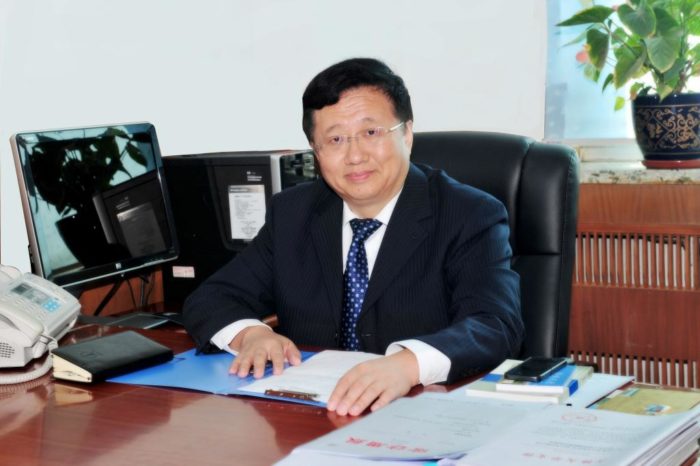
Professor BING Zheng Appointed as Chinese Chair of the Global China Academy Council
Professor BING Zheng has been appointed as the Chinese Chair of the Global China Academy Council by the GCA Board of Trustees on 12 January 2024.
Professor BING Zheng 邴正教授 FGCA, Former Executive Vice-President of Jilin University. Currently, Deputy Director of the Administrative Committee of Jilin University, Director of the Northeast Revitalization Development Research Institute of Jilin University, Professor of the School of Philosophy and Sociology at Jilin University. He has served as President of the Jilin Provincial Academy of Social Sciences, Chair of Jilin Provincial Social Science Federation, Vice Chairman, President of the Jilin Daily newspaper. He is a standing member of the Provincial Political Consultative Conference. He also holds positions as the President of the East Asian Sociological Association (Chinese side), Deputy Director of the Academic Committee of the Chinese Sociological Association, Executive Director of the Chinese Dialectical Materialism Research Association, and President of the Jilin Provincial Sociological Association. He is an expert reviewer for the National Social Science Fund Review Committee, a cross-century talent of the Ministry of Education, a decision-making advisory expert for the Jilin Provincial Committee and Provincial Government, and a senior expert in Jilin Province. He has long been engaged in the teaching and research of philosophy and sociology, with his professional direction being cultural philosophy, developmental sociology, and cultural sociology. He is author of 11 academic books, co-authored, contributed to, and edited more than 30 books, and published over 200 journal articles in major academic journals such as Chinese Social Sciences of China and Philosophical Research.
In 2015, at the 2nd Global China Dialogue on transculturality and new global governance, Professor Bing Zheng delivered keynote speech focusing on cultural communication and regional cooperation amidst globalization. He emphasizes the importance of cultural communication in the globalized world, highlighting the challenges and contradictions it faces, such as the tension between globalism and nationalism, idealism and utilitarianism, and masterism and massism. He discusses how globalization affects cultural exchanges, the role of English and Western culture in shaping global culture, and the impact of technological and economic disparities between developed and developing countries. Zheng calls for a resolution to these cultural contradictions, suggesting it as a historic mission for contemporary intellectuals.
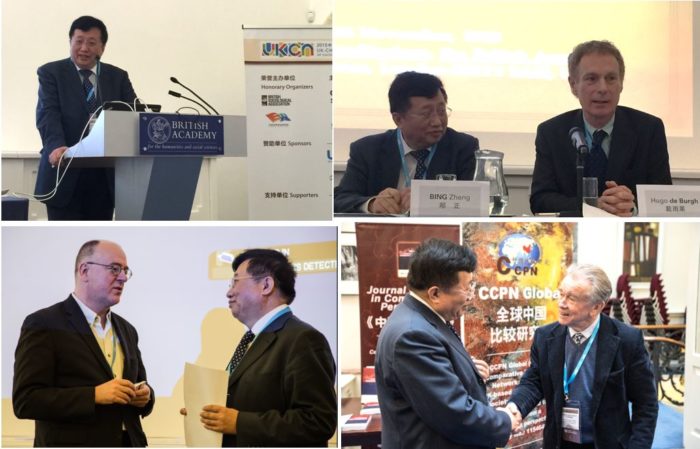
Professor BING Zheng delivered a keynote speech (top left); Professor Hugo de Burgh chaired it (top right); Professor Kerry Brown was another keynote speaker, paired with Professor Bing (bottom left); Professor Martin Albrow met Professor Bing (bottom right).

Professor Bing with some speakers and participants at GCD II (front, the left).
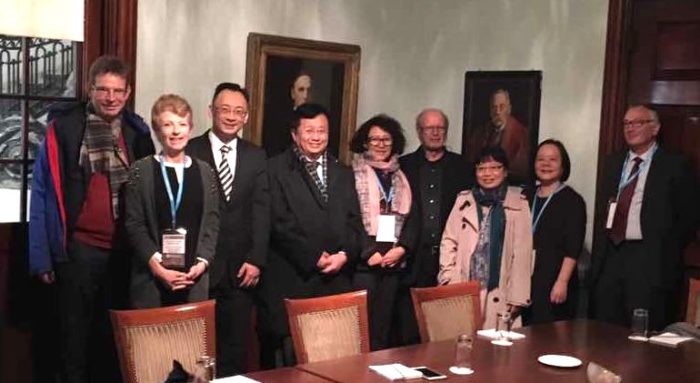
Click here for the Report on the second Global China Dialogue
Professor Bing (4th from the left) also attended a meeting with some organizers of GCD II, including Professor Stephan Feuchtwang (LSE, 4th from the right), Professor Xiangqun Chang (2nd from the right), Ingrid Cranfield (2nd from the left), and Charles Grant (1st from the left).
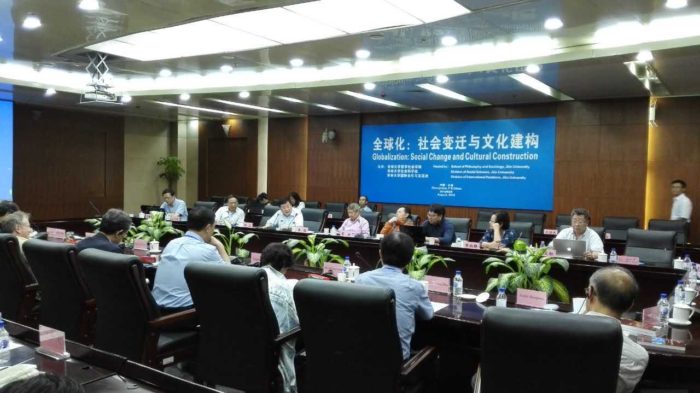
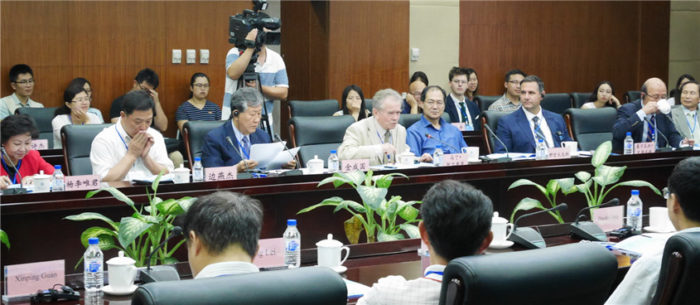
Professor Bing Zheng (3rd from the left in the top photo) organized the international conference ‘Globalization: Social Change and Cultural Construction’ on August 12, 2016, at Jilin University. The conference attracted over 60 experts and scholars from various countries and regions to discuss topics related to globalization, including social development, cross-cultural research, and cultural exchange. Professor Martin Albrow (in the middle in the bottom photo), Honorary President of CCPN Global, and Professor Xiangqun Chang (2nd from the right in the top photo), President of CCPN Global, made speeches at the conference.
‘I am Professor Bing Zheng, and my research field is cultural sociology and cultural philosophy. I am very happy to be an academician of the British Global Chinese Academy. I have visited the United Kingdom and exchanged views with British scholars on issues related to global social development and cultural development. I have a long-term academic exchange friendly relationship with the famous British Professor Albrow-Martin. I am very willing to work hard to promote academic exchanges and cooperation between scholars from China and the United Kingdom, and I wish the UK Global China Academy will do better and better.’ — Video message for the 7th Global China Dialogue and the Academy Funding Dinner on December 10, 2021, at the British Academy.
‘On this joyful occasion of the 10th anniversary of the Global China Academy, I extend my heartfelt thanks and sincere congratulations to the Global China Academy and Professor Chang Xiangqun. Since its inception, the Academy has been a dynamic force in organizing scholars from China and the UK, enhancing academic and cultural exchanges, and fostering academic discussions and publishing activities. It has significantly contributed to connecting scholars and deepening Sino-British understanding and friendships through exchanges and visits. I wholeheartedly wish the Academy continued success in attracting talent, strengthening academic collaboration, and furthering Sino-British friendship and research on globalization, leading to more scholarly achievements.’
Click the picture above to play the video message for the 8th Global China Dialogue and the celebration dinner for the 10th anniversary of the GCA since its establishment in 2013 as CCPN Global, on December 8, 2023, at the House of Lords, the UK Parliament.
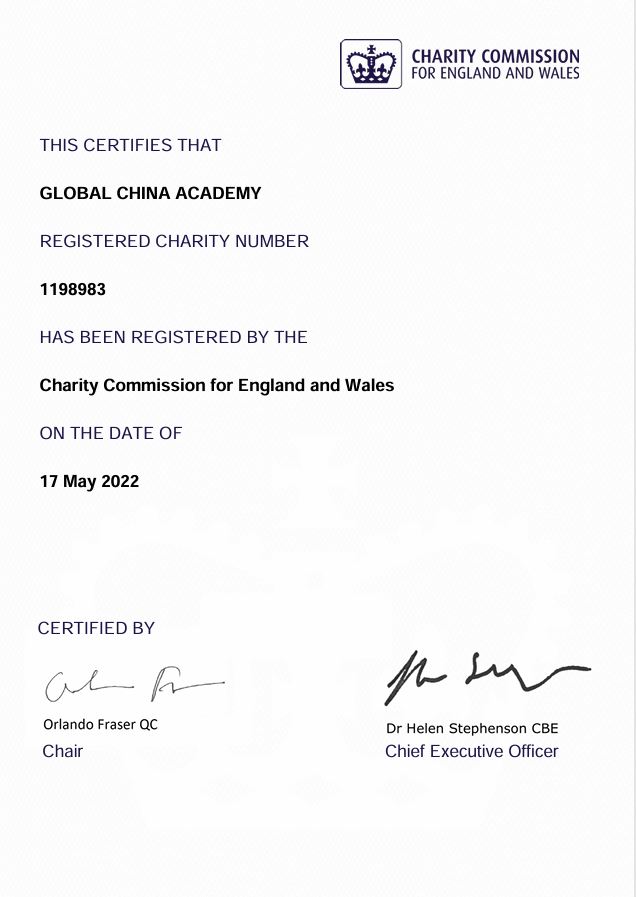
Global China Academy Embarks on a New Chapter with CIO Status, Preserves History Online
Since its renaming in 2019, and following two years of preparation, the Global China Academy completed its transition from an unincorporated charity to a Charitable Incorporated Organisation (CIO). In 2021, the Academy established the world’s only fellowship institution dedicated to China studies and building a global society, with a distinctive three-pronged structure:
- Led by its Fellowships – an eminent intellectual community of distinguished scholars, professionals, and practitioners advancing China studies and contributing to the governance of a global society from global and comparative perspectives.
- Unique Dual Language Publication Platform – producing high-quality works in both English and Chinese, including peer-reviewed journals, and fostering the exchange of ideas and the dissemination of research to audiences worldwide, thereby adding to the sum of human knowledge.
- High-level Dialogue Platform – convening forums and events that bring together leading thinkers, decision-makers, and stakeholders to promote a transdisciplinary approach and transcultural engagement.
Historical and Legal Milestones
Global China Academy (formerly CCPN Global / Global China Institute) was first registered as an unincorporated charity with the UK Charity Commission on 19 November 2013 (No. 1154640). After nearly a decade of academic innovation and global outreach, the Academy transitioned to a Charitable Incorporated Organisation (CIO), officially registered on 27 May 2022 under number 1198983. This new registration replaced its earlier names and structure, providing a stronger and more flexible legal framework. The unincorporated charity formally closed on 31 December 2023 after transferring all assets and activities to the CIO.
Significance of the Transition
Moving to a CIO structure was far more than a procedural change; it marked a strategic shift to enhance the Academy’s capacity to serve academia, education, social development, and cultural exchange worldwide. The mission remains unchanged, but the CIO framework offers greater resilience, enabling broader impact and deeper engagement with international partners.
Legacy and Continuity
Although the unincorporated charity has been deregistered and ceased to exist in legal terms, its legacy endures. This dedicated archive preserves the record of its history and activities over ten years—a decade defined by significant contributions to international understanding and the advancement of our mission. Under the CIO, that work continues, stronger than ever.
Accounts and annual return reports
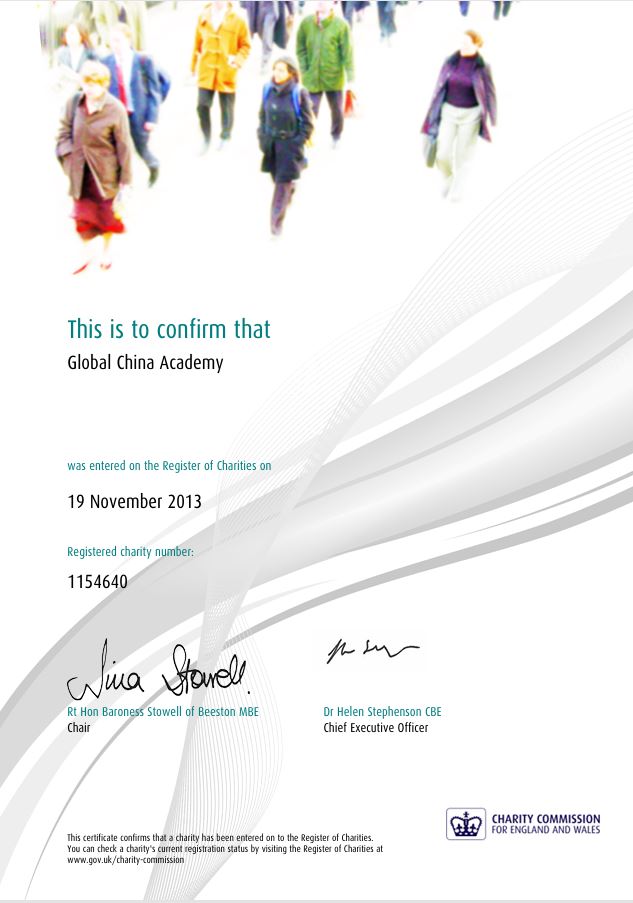
Screenshots of our previous Charity (number 1154640) from UK Charity Commission website:
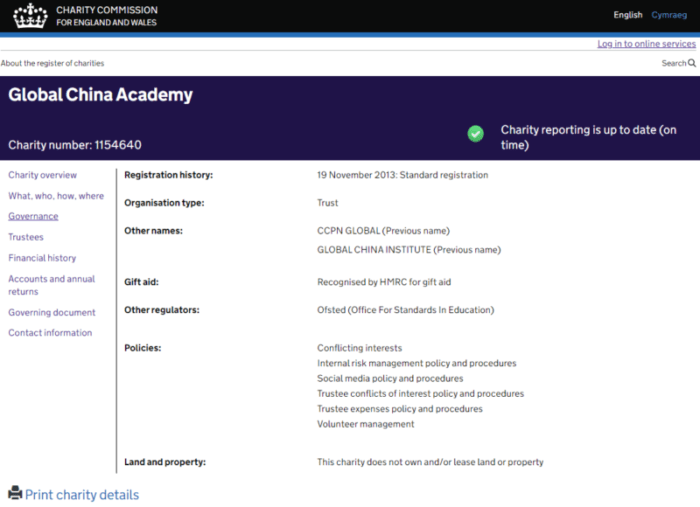
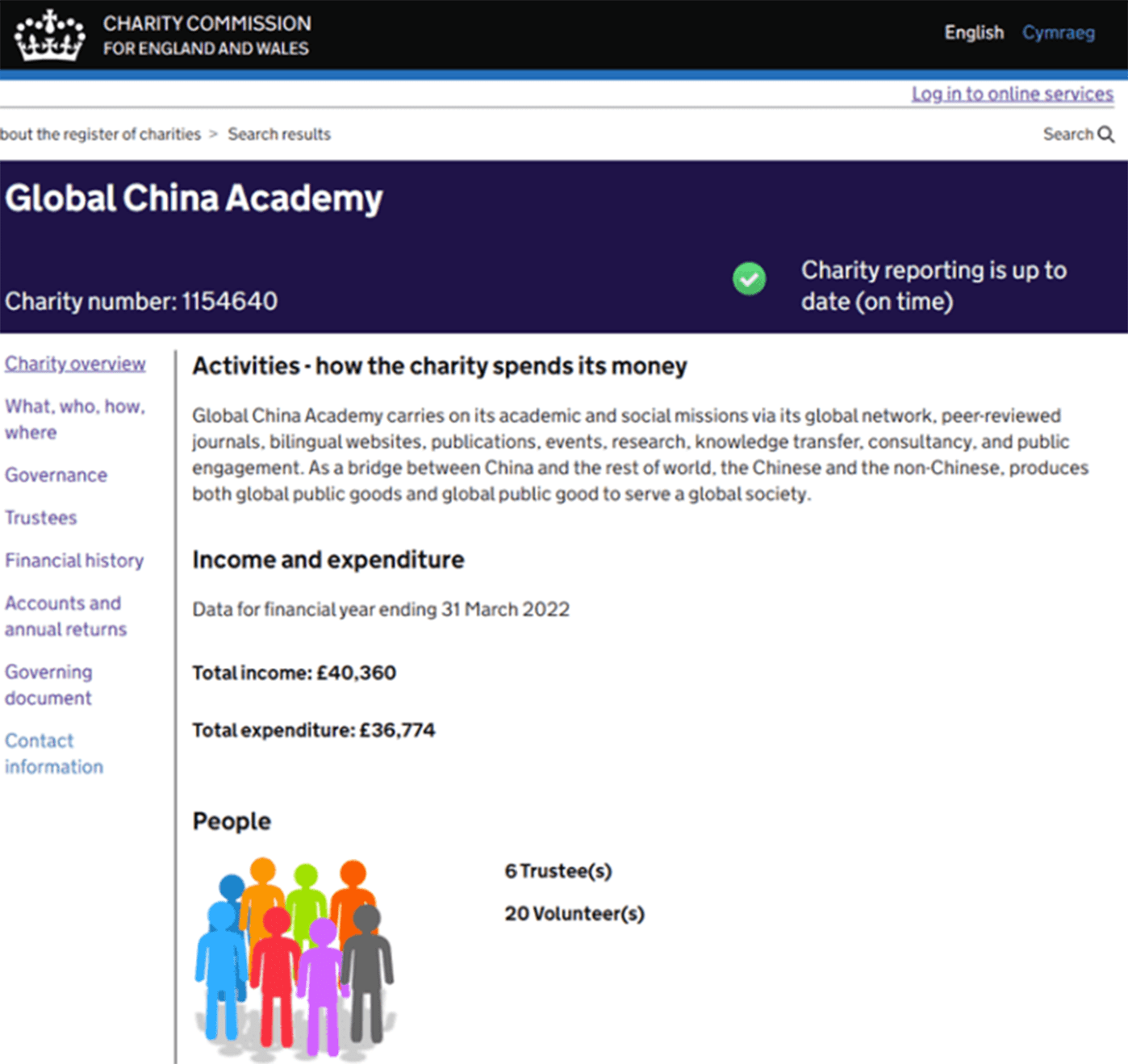
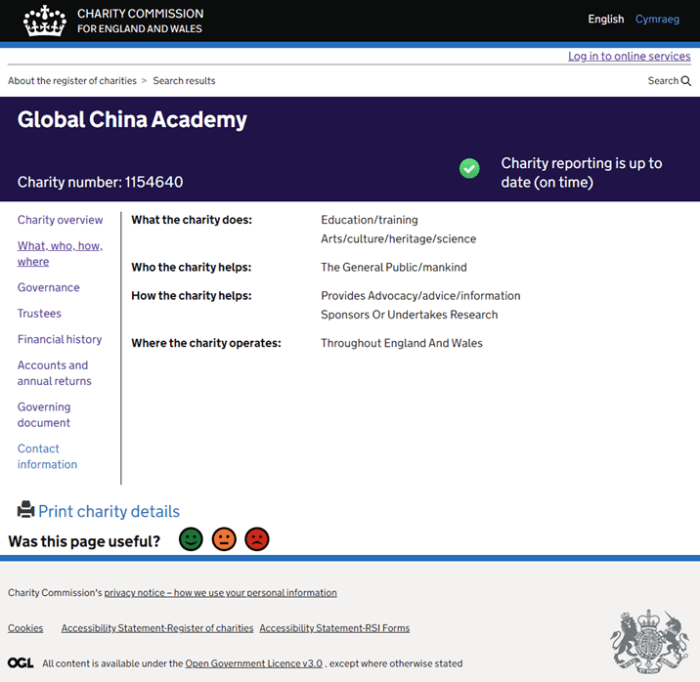

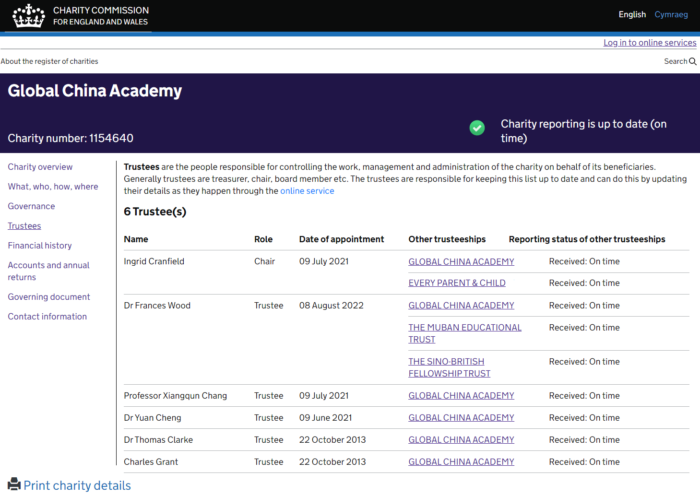
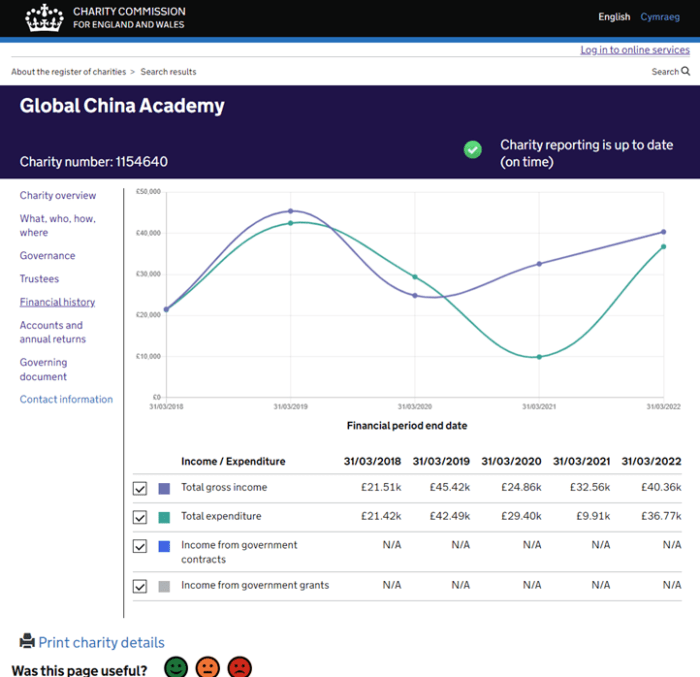
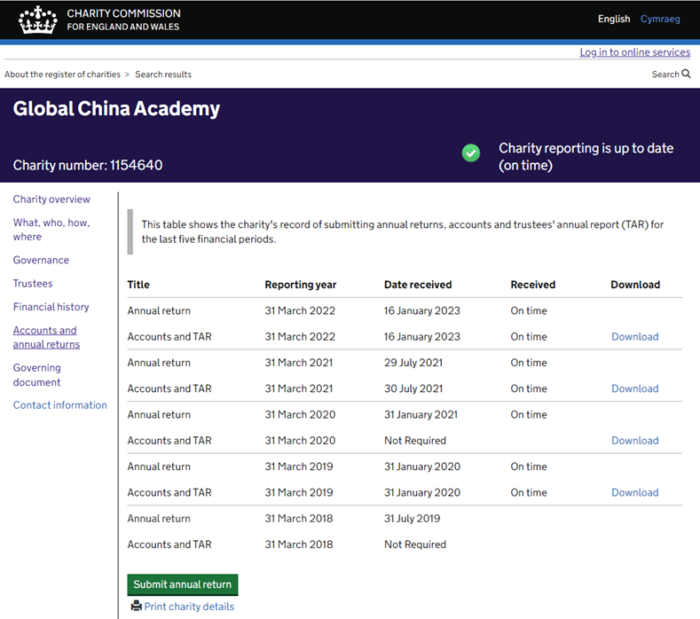
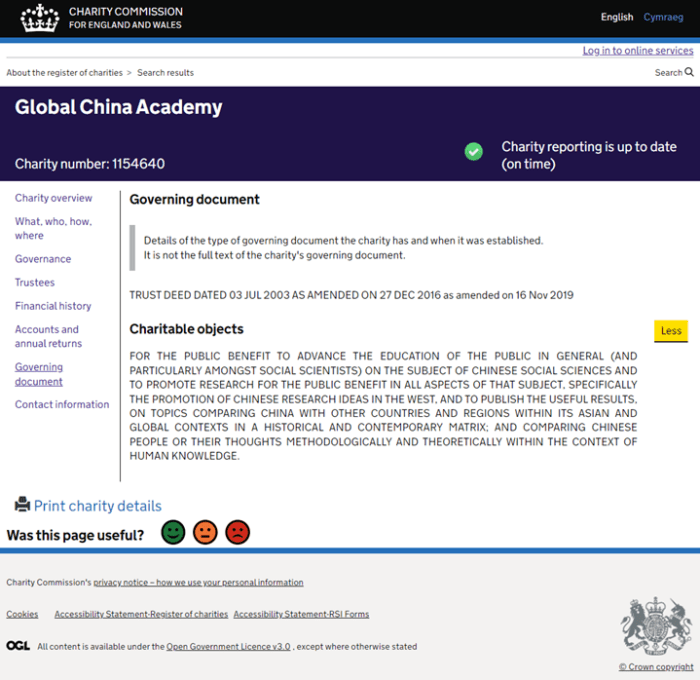
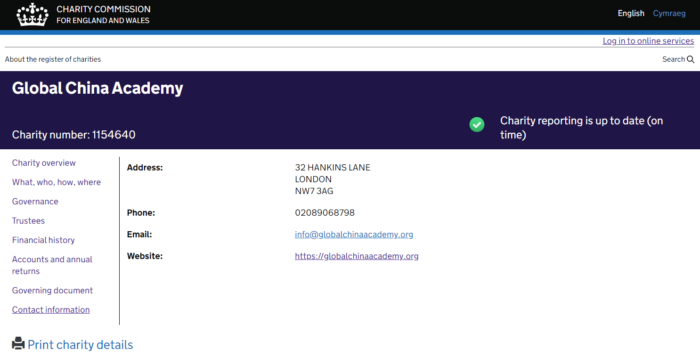
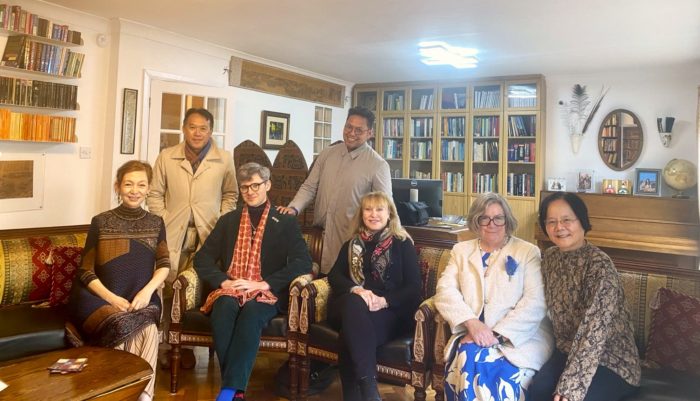
2023: The First Year of Implementing the ‘Reform and Opening-Up Policy’ at the GCA Centre
The year 2023 marked the 10th anniversary of the Global China Academy (GCA), which was founded in 2013 as CCPN Global. GCA’s operations are supported through outsourcing to experts in various fields, such as website design and maintenance, graphic design, translation, copy editing and more. Additionally, individuals who align with our academic and social missions significantly contribute on a voluntary basis. As an independent non-profit academic institution, our independence is evident in the transparency of our funding sources, which are available for scrutiny by anyone at any time, and in Global Century Press’s commitment to publishing uncensored work on China.
One of the panels of the 7th Global China Dialogue (GCD) was ‘Reforming the Institutions’. Professor Martin Albrow, Funding and Past Honorary President of GCA, encouraged the GCA to reform itself into a sustainable institution. In addition to leveraging existing publication revenues, GCD-based income and small fellowship subscriptions, in 2023 we initiated our own version of a ‘reform and opening-up policy’ which encompasses ‘outreach and invitation’, following consultation and approval from the GCA Board of Trustees. This innovative policy involves utilizing the property occupied by the GCA Centre to create funding opportunities through extensive networking. This page showcases some reform-related activities, outcomes, or potential long-term benefits.
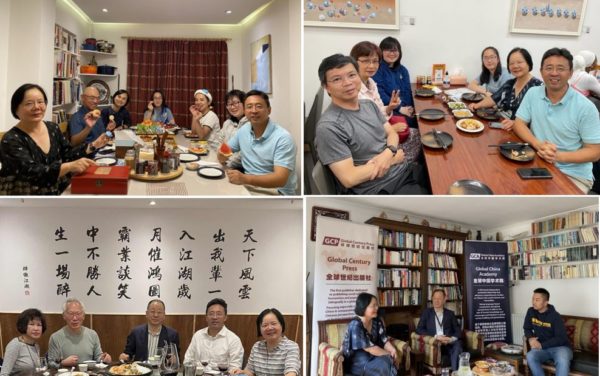
From July 4-10, the GCA Fellows’ Home welcomed guests from Hong Kong and Macau. While the GCA Centre has previously hosted speakers and participants for GCA events, offering free accommodation in exchange for volunteer work, this occasion marked the first time it was opened to GCA friends for networking purposes, aiming to fulfil both academic and social missions. Introduced by Professor Xiangqun Chang’s golf friend, Kai Liang (an Ambassador of the Hampton Court Golf Club and Director of Business Development of MEL Science, second from the left in the left photo), Dr Pu Zhai (President for Ascendent Capital Partners (Asia) Limited, Hong Kong, first on the right in the left photo) and his daughters were accommodated at the Fellows’ Home. Dr Zhai introduced some of his friends to Professor Chang, including guests from Macau (third from the right in the left photo), Singapore (first and second from the left in the second photo), and London, including Dr Chen and her husband (first and second from the left in the right photo), and Dr Frank Guo (Chairman of New Beacon Group, in the middle of the second photo from the left).
Later in July, Dr Guo (middle in the right photo) attended a meeting with DU Yichao, who visited the UK in preparation for the Wuxi City delegation in August. He is Director of Wuxi Institute of New Culture, PhD student of UCL and GCA Associate.
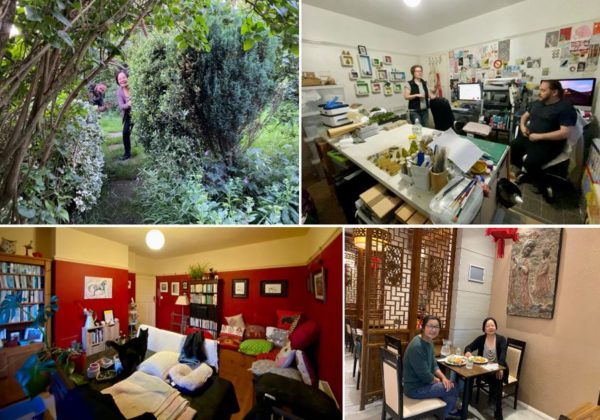
On July 19, Professor Xiangqun Chang visited the home of Mr Mark Lee, GCA’s Graphic Designer, and Mrs Sarah Lee, GCA’s Librarian (both in the second photo above), in Sheffield. In addition to discussing GCA’s work, they enjoyed playing hide and seek in their ‘secret garden’ and explored unique rooms with different colours and their work studio. During their visit after the 7th Global China Dialogue in 2021, they contributed to the development of the GCA Centre’s five ‘walk and talk’ routes and enjoyed Routes 1 and 2. A few days later, Professor Chang hosted a farewell meal for the retired GCA Administrative Manager, Zhufeng Sheng (left in the fourth photo).
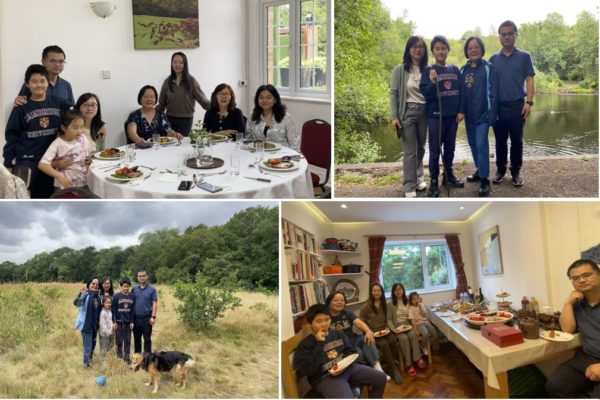
On July 22, the two Chinese sociologists whom Professor Chang met at SOAS in May visited the GCA Centre. They are Dr QIN Chen (who stands under the picture in the left photo), Associate Professor at Hohai University, and Dr YUE Shaohua (who is pictured with a family of four in the left photo), Associate Research Fellow at the Jiangsu Academy of Social Sciences. Dr Yue’s wife, Dr ZHANG Haihua, is a Visiting Fellow at LSE from Nanjing Agricultural University. All of them graduated from Nanjing University under the supervision of either Professor SONG Linfei, former President of the Jiangsu Academy of Social Sciences and the Chinese Sociological Association, or Professor ZHOU Xiaohong, the founding Dean of the School of Social and Behavioural Sciences at Nanjing University. They enjoyed the GCA Centre’s ‘walk and talk’ route 2, which includes lunch and tea, offering a blend of leisure, learning, and physical activity to enhance the experience for visitors.
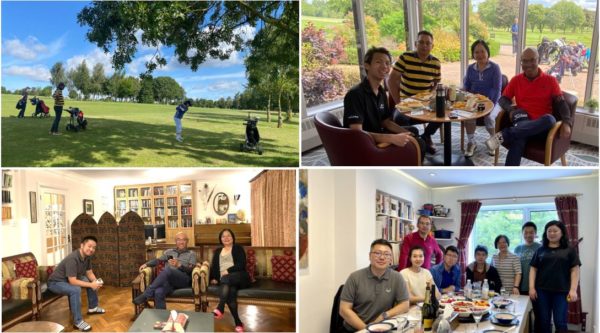
From August 6-7, Mr Kai Liang attended a meeting with DU Yichao at the GCA Centre in preparation for the Wuxi (London) Promotion Conference scheduled for August 9. The following day, Professor Chang met with Mr David Liu, Manager of the Brocket Hall Golf Club, and played golf with Mr Kai Liang and his son at the Winter Hill Golf Club. The preparations for the 7th Global China Dialogue: Governance for Global Health (GCD II) were discussed. A few days later, David’s family and relatives visited the GCA Centre. They all shared GCA’s social mission and expressed their support for GCD II.

From September 10-11, LI Li, the Founder and Honorary Curator of the Guangzhou Thirteen Hongs Museum, spent two days at the GCA Fellows’ Home. She is a Visiting Fellow at the Fitzwilliam Museum and a Fellow of Lucy Cavendish College, University of Cambridge. The museum is located on the historical site of the Qing Dynasty trading posts in Guangzhou. It houses more than 6,600 artifacts, highlighting Guangzhou’s significant role in the ancient Maritime Silk Road and its exclusive maritime trade with Europe and America. A large number of Western-style products that incorporate Chinese elements showcase the shared beauty between China and the West during the 18th and 19th centuries, representing the outcomes of transcultural exchange. Their importance today highlights the early stages of globalization, emphasizing the critical importance of mutual understanding and cooperation in shaping a global society, international relations, and trade. During LI Li’s stay, she and Professor Chang visited the British Library, attended the ‘China’s Hidden Century’ exhibition at the British Museum, and played golf at Brocket Hall.

On September 13, some GCA colleagues gathered socially at the GCA Centre and Mill Hill Golf Club. Professor Martin Albrow (left in the right photo) discussed his upcoming trip to China in one month. Professor Xiangqun Chang shared her experiences of adopting a new lifestyle of living alone in an ’empty nest’ and ‘living with separation’ (Charles Stafford, 2003), after her husband, Dr Thomas Clarke (GCA Trustee, right in the left photo), moved to his father’s house after the COVID-19 and decided to stay there even after his father’s passing. Dr Frances Wood (2nd from the left in both photos) shared her knowledge about the history of the Guangzhou Thirteen Hongs and expressed appreciation that GCP was considering publishing an oral history of Isabel Crook (1915-2023), whom she knew very well.
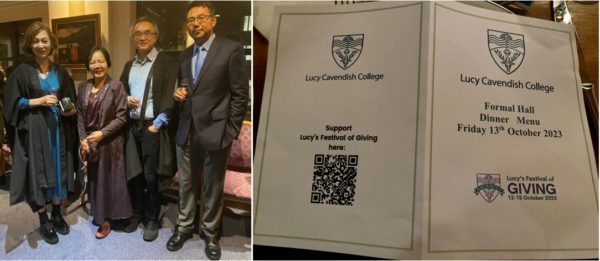
On October 13, Professor Xiangqun Chang and David Liu were invited by LI Li to attend Lucy’s Festival of Giving, where they met Dr Xin Fan (second from the right in the left photo), ‘a global citizen’ who has studied and taught at universities in China, Germany, the USA, and the UK. He serves as Director of Studies in Asian and Middle Eastern Studies and as a Teaching Associate in Modern Chinese History at the Faculty of Asian and Middle Eastern Studies. Professor Chang and Dr Jane Greatorex exchanged their details at the high table. She is a Senior Tutor, Graduate and Undergraduate Tutor, Director of Studies in Pre-Clinical Part II Veterinary Medicine, and Honorary Scientist at Public Health England. The event provided a valuable opportunity for networking and sharing insights among professionals from diverse academic and cultural backgrounds, enriching the dialogue on global citizenship and interdisciplinary collaboration.
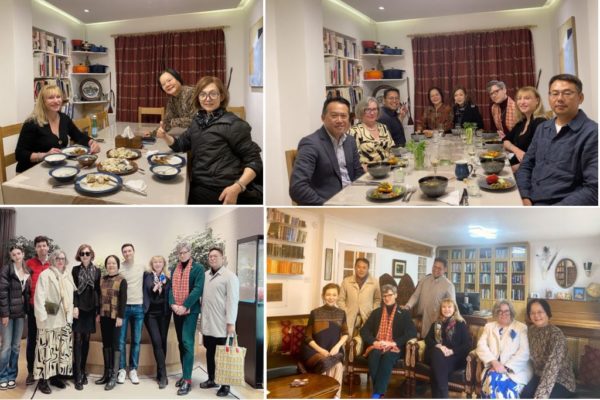
From October 27-29, during the Asian Art in London event, the GCA Centre welcomed Fellows and guests from Cambridge. The distinguished visitors included LI Li, Fellow of Lucy Cavendish College (LCC); Alison Vinnicombe, Praelector, Registrar, Archivist, and Dean of Discipline LCC; Dr James Lin, Curator of the Asia Department at the Fitzwilliam Museum, Cambridge; Jeni Kong, Trustee of the Confucius Better World Foundation and daughter-in-law to the 78th generation descendant of Confucius, notably the only person of non-Chinese ethnic; Rory Hutton, Designer at Rory Hutton Ltd; and Dr Kim Yahya, Principal Scientist at WaveBreak. David Liu played a key role in hosting the event. It is the first time the GCA Centre has received guests for non-GCA events. A total of eight individuals from eight different disciplines and five ethnic backgrounds came together, united by their shared interests. The discussions were engaging and filled with enthusiasm. Everyone felt that the GCA Centre truly deserved to be called a ‘Fellows’ Home’ and enjoyed being treated as such.
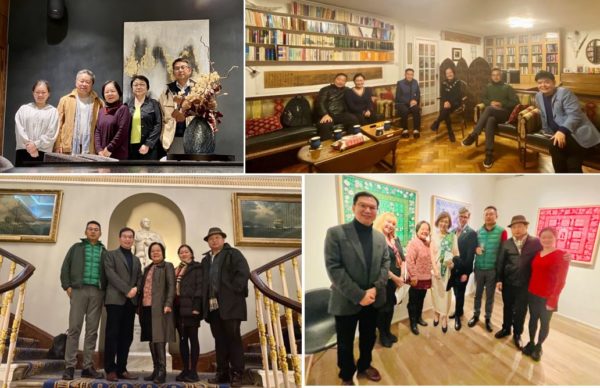
From November 7-10, Dr Yuan Cheng (second from the right in the left photo), a GCA Trustee, visited the UK. Coincidentally, she is a friend with Dr Pu Zhai from the Oxbridge Alumni Network. Following Dr Zhai’s recommendation in early July during his stay at the GCA Centre, Dr Cheng and Professor Chang met with some professionals suggested by Dr Zhai. These included Alan Fang (a lawyer, second from the left in the left photo), his wife Katie Zheng (a solicitor, first on the left in the left photo), Dr Ian Zhu (an accountant, first on the right in the second photo from the left), and Terry Ho (an accountant, second from the left in the second photo from the right). Many of them attended Rory Hutton’s ‘Gardening in Linocut’ exhibition, where they met LI Li, Rory, and Joni. They enjoyed the distinct styles of art on display and discovered elements of Chinese culture within them.

On December 7, participants and volunteers of GCD VIII took pleasure in preparing snacks and cakes for the Tea Party scheduled to be held at Lucy Cavendish College’s ‘Fellows’ Home’—Marshall House. WANG Conghan, a PhD candidate from Zhejiang Gongshang University (second from the left in the left photo), and SHA Yuze, a PhD candidate from Lancaster University (in the second photo from the left), created the Christmas Tree Cheese Ball Appetizer. MENG Jialin, an interpreter (featured in the right two photos), prepared an Italian Pandoro Christmas Tree Cake. Their contributions were greatly appreciated by the party attendees. Dr Jane Greatorex of LCC specifically mentioned their efforts in her email.
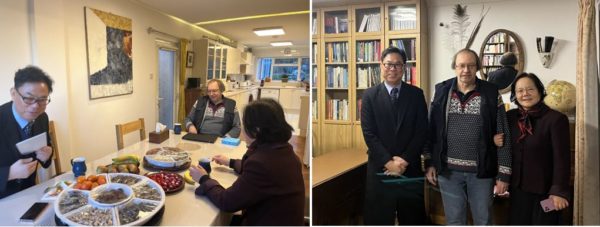
On December 11th, Dr QIAN Zhenhua met with GCA Treasurer Dr Thomas Clarke at the GCA Centre to discuss China’s complex global relationships, including Taiwan, South China Sea disputes, and its influence on ASEAN countries. They explored the challenges facing democracy, such as nationalism and misinformation. Dr Clarke inquired about China’s role in global progress. Dr Qian admired Clarke’s vision but cited challenges for Chinese influence due to internal and external factors.
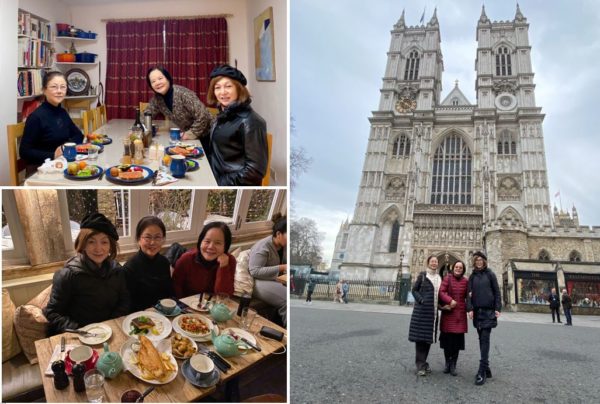
On December 21st, before her departure back to China, together with LI Li, a farewell gathering was held at the GCA Fellows’ Home for LIAO Nong (left in the left photo), Chief Physician of the Plastic Surgery Department at the Third Affiliated Hospital of Guangzhou Medical University. She presented a paper on ‘Challenges faced by the medical beauty industry’ at the 8th Global China Dialogue on December 8th, 2023.
We visited central London and Oxford together. During the gathering, LI Li expressed a strong desire to meet Dr Frances Wood to seek advice and resources for digitalizing the Guangzhou Thirteen Hongs Museum. The meeting was arranged with outdoor activities on February 4th, 2024 (Click here to find more).
In conclusion, the year 2023 has been a landmark period for the Global China Academy (GCA), marking a decade of significant growth, outreach, and innovation since its inception. Celebrating its 10th anniversary, GCA has not only upheld its commitment to promoting academic exchange, research dissemination, and cultural communication but has also ventured into new territories with the implementation of the ‘Reform and Opening-Up Policy.’ Endorsed by the GCA board, this policy represents a strategic pivot towards utilizing GCA’s assets more effectively, thereby ensuring the institution’s sustainability and expanding its impact.
The diverse range of activities and engagements throughout the year underscores GCA’s role as a dynamic platform for fostering understanding and cooperation between China and the global community. The introduction of the GCA Centre and the establishment of the Fellows’ Home as a space for academic hospitality have further cemented GCA’s reputation as a forward-thinking and inclusive institution.
Through strategic collaborations, extensive networking, and a steadfast dedication to its mission, GCA continues to shape the dialogue on global governance, cultural exchange, and academic collaboration. As we reflect on the achievements of the past year and look forward to the future, it is clear that GCA is poised for even greater contributions to global academic and social missions, driven by a commitment to reform, openness, and mutual understanding. By embracing change, fostering innovation, and promoting inclusivity, GCA is redefining what it means to be a global academic institution in the 21st century.

2023年:全球中国学术院中心实施“改革开放政策”的第一年
The year 2023 marks the 10th anniversary of the Global China Academy (GCA), which was founded in 2013 as CCPN Global. GCA’s operations are supported through outsourcing to experts in various fields, such as website design and maintenance, graphic design, translation, copy editing, and more. Additionally, individuals who align with our academic and social missions significantly contribute on a voluntary basis. As an independent non-profit academic institution, our independence is evident in the transparency of our funding sources, which are open for examination at any time, and our commitment through Global Century Press to publishing uncensored work on China.
2023年标志着全球中国学院(GCA)成立10周年,该学院于2013年作为全球中国比较研究会(CCPN Global)成立。GCA的运营通过外包给各个领域的专家支持,如网站设计与维护、平面设计、翻译、文案编辑等。此外,与我们的学术和社会使命一致的个人也通过自愿贡献显著地参与其中。作为一个独立的非营利学术机构,我们的独立性在于我们资金来源的透明度,这些资金来源随时开放供审查,以及我们通过全球世纪出版社对中国的未经审查的作品的出版承诺。
One of panels of the 7th Global China Dialogue: reforming global governance is ‘Reforming the Institutions’. Professor Martin Albrow, Founding and Past Honorary President of GCA, encouraged the GCA to reform itself into a sustainable institution. In addition to leveraging existing publication revenues, dialogue-based income, and small fellowship subscriptions, in 2023, after seeking advice and approval from the GCA Board of Trustees, we have implemented an innovative policy. This policy involves utilizing the property occupied by the GCA Centre to create funding opportunities through extensive networking. This page showcases some reform-related activities, outcomes, or potential long-term benefits.
第七届全球中国对话的其中一个小组讨论是“改革全球治理:改革机构”。GCA的创始人及前荣誉会长马丁·阿尔布罗教授鼓励GCA将自身改革成为一个可持续的机构。除了利用现有的出版收入、基于对话的收入和小额研究员订阅外,2023年,在征求GCA董事会的建议和批准后,我们实施了一项创新政策。该政策涉及利用GCA中心占用的房产通过广泛的网络创建资金机会。本页展示了一些与改革相关的活动、成果或潜在的长期利益。

从7月4日至10日,GCA研究员之家欢迎了来自香港和澳门的客人。尽管GCA中心此前已经为GCA活动的演讲者和参与者提供了免费住宿以换取志愿服务,但这次是首次将其开放给GCA的朋友们进行网络交流,旨在实现学术和社会使命。由向群昌教授的高尔夫朋友,凯亮(汉普顿宫高尔夫俱乐部大使兼MEL科学的业务发展总监,左边照片中从左数第二位),介绍,蔡朴博士(升华资本合伙人(亚洲)有限公司,香港,总裁,左边照片中最右边)及其女儿们被安排在研究员之家住宿。蔡博士向向教授介绍了一些他的朋友,包括来自澳门的客人(左边照片中从右数第三位),新加坡的客人(第二张照片中从左数第一位和第二位),伦敦的客人,包括陈博士及其丈夫(右边照片中从左数第一位和第二位),以及郭峰博士(新辉集团董事长,左二照片中间)。
7月26日,郭博士(右边照片中间)参加了与杜一超的会面,杜一超为了准备8月份的无锡市代表团访问英国而来。他是无锡新文化研究所所长,UCL的博士生以及GCA的合作伙伴。
From July 4-10, the GCA Fellows’ Home welcomed guests from Hong Kong and Macau. While the GCA Centre has previously hosted speakers and participants for GCA events, offering free accommodation in exchange for volunteer work, this occasion marked the first time it was opened to GCA friends for networking purposes, aiming to fulfil both academic and social missions. Introduced by Professor Xiangqun Chang’s golf friend, Kai Liang (an Ambassador of the Hampton Court Golf Club and Director of Business Development of MEL Science, second from the left in the left photo), Dr Pu Zhai (President for Ascendent Capital Partners (Asia) Limited, Hong Kong, first on the right in the left photo) and his daughters were accommodated at the Fellows’ Home. Dr Zhai introduced some of his friends to Professor Chang, including guests from Macau (third from the right in the left photo), Singapore (first and second from the left in the second photo), and London, including Dr Chen and her husband (first and second from the left in the right photo), and Dr Frank Guo (Chairman of New Beacon Group, in the middle of the second photo from the left).
On July 26, Dr Guo (middle in the right photo) attended a meeting with DU Yichao, who visited the UK in preparation for the Wuxi City delegation in August. He is Director of Wuxi Institute of New Culture, PhD student of UCL and GCA Associate.

7月22日,那两位5月份在伦敦大学亚非学院(SOAS)与向群昌教授会面的中国社会学家访问了GCA中心。他们是河海大学的副教授秦晨博士(站在左边照片中的画下面),以及江苏省社会科学院的副研究员岳少华博士(在左边照片中与一家四口一起的人)。岳博士的妻子,张海华博士,来自南京农业大学,是伦敦经济学院的访问学者。他们都是在宋林飞教授或周晓虹教授的指导下于南京大学毕业的,宋林飞教授是江苏省社会科学院以及中国社会学会的前任院长,周晓虹教授是南京大学社会与行为科学学院的创始院长。他们享受了GCA中心的“边走边谈”第二路线,其中包括午餐和茶点,提供了休闲、学习和体育活动的完美结合,以增强访客的体验。
On July 22, the two Chinese sociologists whom Professor Chang met at SOAS in May visited the GCA Centre. They are Dr QIN Chen (who stands under the picture in the left photo), Associate Professor at Hohai University, and Dr YUE Shaohua (who is pictured with a family of four in the left photo), Associate Research Fellow at the Jiangsu Academy of Social Sciences. Dr Yue’s wife, Dr ZHANG Haihua, is a Visiting Fellow at LSE from Nanjing Agricultural University. All of them graduated from Nanjing University under the supervision of either Professor SONG Linfei, former President of the Jiangsu Academy of Social Sciences and the Chinese Sociological Association, or Professor ZHOU Xiaohong, the founding Dean of the School of Social and Behavioural Sciences at Nanjing University. They enjoyed the GCA Centre’s ‘walk and talk’ route 2, which includes lunch and tea, offering a blend of leisure, learning, and physical activity to enhance the experience for visitors.

从8月6日至7日,凯亮先生参加了在GCA中心与杜一超的会议,为8月9日计划的无锡(伦敦)推广会做准备。次日,向群昌教授与布罗克特霍尔高尔夫俱乐部的经理刘大卫先生会面,并与凯亮先生及其儿子一同在冬山高尔夫俱乐部打高尔夫。他们讨论了第七届全球中国对话:全球健康治理(GCD II)的准备工作。几天后,大卫的家人和亲戚访问了GCA中心。他们都分享了GCA的社会使命,并表达了对GCD II的支持。
From August 6-7, Mr Kai Liang attended a meeting with DU Yichao at the GCA Centre in preparation for the Wuxi (London) Promotion Conference scheduled for August 9. The following day, Professor Chang met with Mr David Liu, Manager of the Brocket Hall Golf Club, and played golf with Mr Kai Liang and his son at the Winter Hill Golf Club. The preparations for the 7th Global China Dialogue: Governance for Global Health (GCD II) were discussed. A few days later, David’s family and relatives visited the GCA Centre. They all shared GCA’s social mission and expressed their support for GCD II.

从9月10日至11日,广州十三行博物馆的创始人兼名誉馆长李丽在GCA研究员之家度过了两天。她是剑桥大学菲茨威廉博物馆的访问学者和露西·卡文迪许学院的研究员。该博物馆位于广州清代贸易哨所的历史遗址上。它收藏了超过6600件文物,凸显了广州在古代海上丝绸之路中的重要角色及其与欧洲和美洲的独家海上贸易。大量融入中国元素的西式产品展示了18和19世纪中西之间的共享美,代表了跨文化交流的成果。它们今天的重要性突出了全球化的早期阶段,强调了在塑造全球社会、国际关系和贸易中,相互理解与合作的关键重要性。在李丽的访问期间,她和向教授参观了大英图书馆,参加了大英博物馆的“中国的隐藏世纪”展览,并在布罗克特霍尔打高尔夫。
From September 10-11, LI Li, the Founder and Honorary Curator of the Guangzhou Thirteen Hongs Museum, spent two days at the GCA Fellows’ Home. She is a Visiting Fellow at the Fitzwilliam Museum and a Fellow of Lucy Cavendish College, University of Cambridge. The museum is located on the historical site of the Qing Dynasty trading posts in Guangzhou. It houses more than 6,600 artifacts, highlighting Guangzhou’s significant role in the ancient Maritime Silk Road and its exclusive maritime trade with Europe and America. A large number of Western-style products that incorporate Chinese elements showcase the shared beauty between China and the West during the 18th and 19th centuries, representing the outcomes of transcultural exchange. Their importance today highlights the early stages of globalization, emphasizing the critical importance of mutual understanding and cooperation in shaping a global society, international relations, and trade. During LI Li’s stay, she and Professor Chang visited the British Library, attended the ‘China’s Hidden Century’ exhibition at the British Museum, and played golf at Brocket Hall.

9月13日,一些GCA同事在GCA中心和米尔希尔高尔夫俱乐部进行了社交聚会。马丁·阿尔布罗教授(右图左侧)讨论了他一个月后即将前往中国的行程。向群昌教授分享了她的经历,讲述了在她的丈夫托马斯·克拉克博士(GCA信托人,左图右侧)因新冠疫情搬到他父亲家后决定留在那里,即使在他父亲去世后,她也开始采纳一种新的生活方式,独自生活在“空巢”中,并“与分离共处”(查尔斯·斯塔福德,2003)。弗兰西斯·伍德博士(两张照片中均为从左数第二位)分享了她对广州十三行历史的了解,并表示赞赏GCP考虑出版伊莎贝尔·克鲁克(1915-2023)的口述历史,她对此人非常了解。
On September 13, some GCA colleagues gathered socially at the GCA Centre and Mill Hill Golf Club. Professor Martin Albrow (left in the right photo) discussed his upcoming trip to China in one month. Professor Xiangqun Chang shared her experiences of adopting a new lifestyle of living alone in an ’empty nest’ and ‘living with separation’ (Charles Stafford, 2003), after her husband, Dr Thomas Clarke (GCA Trustee, right in the left photo), moved to his father’s house after the COVID-19 and decided to stay there even after his father’s passing. Dr Frances Wood (2nd from the left in both photos) shared her knowledge about the history of the Guangzhou Thirteen Hongs and expressed appreciation that GCP was considering publishing an oral history of Isabel Crook (1915-2023), whom she knew very well.

10月13日,向群昌教授和刘大卫被李丽邀请参加露西的布施节,在那里他们遇到了范欣博士(左图中从右数第二位),一位“全球公民”,他在中国、德国、美国和英国的大学中学习和教学。他担任亚洲和中东研究的研究主任以及现代中国历史的教学副手,属于亚洲和中东研究系。向教授和简·格雷托里克斯博士在高桌上交换了他们的联系方式。她是一位高级导师、研究生和本科生导师、临床前第二部分兽医学研究的研究主任以及英国公共卫生署的荣誉科学家。这个活动为来自不同学术和文化背景的专业人士提供了一个宝贵的交流和分享见解的机会,丰富了关于全球公民身份和跨学科合作的对话。
On October 13, Professor Xiangqun Chang and David Liu were invited by LI Li to attend Lucy’s Festival of Giving, where they met Dr Xin Fan (second from the right in the left photo), ‘a global citizen’ who has studied and taught at universities in China, Germany, the USA, and the UK. He serves as Director of Studies in Asian and Middle Eastern Studies and as a Teaching Associate in Modern Chinese History at the Faculty of Asian and Middle Eastern Studies. Professor Chang and Dr Jane Greatorex exchanged their details at the high table. She is a Senior Tutor, Graduate and Undergraduate Tutor, Director of Studies in Pre-Clinical Part II Veterinary Medicine, and Honorary Scientist at Public Health England. The event provided a valuable opportunity for networking and sharing insights among professionals from diverse academic and cultural backgrounds, enriching the dialogue on global citizenship and interdisciplinary collaboration.

从10月27日至29日,在伦敦亚洲艺术活动期间,GCA中心欢迎了来自剑桥的研究员和客人。杰出的访客包括露西·卡文迪许学院(LCC)的研究员李丽;Alison Vinnicombe,LCC的讲师、注册官、档案管理员和纪律院长;剑桥菲茨威廉博物馆亚洲部门的馆长林詹姆斯博士;孔令娟,孔子第七十八代后裔的儿媳妇,也是孔子家族唯一的非华裔人士,同时也是孔子更美好世界基金会的信托人;设计师Rory Hutton,Rory Hutton有限公司的创始人;以及WaveBreak的首席科学家金雅博士。刘大卫在主持这次活动中发挥了关键作用。这是GCA中心首次接待非GCA活动的客人。共有来自八个不同学科和五个种族背景的八位个体聚在一起,他们因共同的兴趣而团结。讨论充满了热情和活力。每个人都感觉GCA中心真正配得上“研究员之家”的称号,并享受如此的待遇。
From October 27-29, during the Asian Art in London event, the GCA Centre welcomed Fellows and guests from Cambridge. The distinguished visitors included LI Li, Fellow of Lucy Cavendish College (LCC); Alison Vinnicombe, Praelector, Registrar, Archivist, and Dean of Discipline LCC; Dr James Lin, Curator of the Asia Department at the Fitzwilliam Museum, Cambridge; Jeni Kong, Trustee of the Confucius Better World Foundation and daughter-in-law to the 78th generation descendant of Confucius, notably the only person of non-Chinese ethnic; Rory Hutton, Designer at Rory Hutton Ltd; and Dr Kim Yahya, Principal Scientist at WaveBreak. David Liu played a key role in hosting the event. It is the first time the GCA Centre has received guests for non-GCA events. A total of eight individuals from eight different disciplines and five ethnic backgrounds came together, united by their shared interests. The discussions were engaging and filled with enthusiasm. Everyone felt that the GCA Centre truly deserved to be called a ‘Fellows’ Home’ and enjoyed being treated as such.

从11月7日至10日,GCA信托人成远博士(左边照片中从右数第二位)访问了英国。巧合的是,她与来自牛津剑桥校友网络的蔡朴博士是朋友。继蔡博士在7月初他在GCA中心的停留期间的推荐之后,成博士和向教授会见了蔡博士建议的一些专业人士。这些人包括方律师(左边照片中从左数第二位)、他的妻子郑律师(左边照片中最左边)、朱博士(会计师,从左第二张照片中最右边)、和何先生(会计师,从右第二张照片中从左数第二位)。他们中的许多人参加了Rory Hutton的“亚麻刻印中的园艺”展览,在那里他们遇到了李丽、Rory和Joni。他们享受展出的独特艺术风格,并在其中发现了中国文化的元素。
From November 7-10, Dr Yuan Cheng (second from the right in the left photo), a GCA Trustee, visited the UK. Coincidentally, she is a friend with Dr Pu Zhai from the Oxbridge Alumni Network. Following Dr Zhai’s recommendation in early July during his stay at the GCA Centre, Dr Cheng and Professor Chang met with some professionals suggested by Dr Zhai. These included Alan Fang (a lawyer, second from the left in the left photo), his wife Katie Zheng (a solicitor, first on the left in the left photo), Dr Ian Zhu (an accountant, first on the right in the second photo from the left), and Terry Ho (an accountant, second from the left in the second photo from the right). Many of them attended Rory Hutton’s ‘Gardening in Linocut’ exhibition, where they met LI Li, Rory, and Joni. They enjoyed the distinct styles of art on display and discovered elements of Chinese culture within them.

12月7日,GCD VIII的参与者和志愿者们乐在其中,为在露西·卡文迪许学院的“研究员之家”——马歇尔屋举办的茶会准备了小吃和蛋糕。浙江工商大学的博士候选人王聪汉(左边照片中从左数第二位)和兰卡斯特大学的博士候选人沙玉泽(从左第二张照片中出现),共同制作了圣诞树奶酪球开胃菜。口译员孟佳琳(在右边两张照片中出现)准备了意大利潘多罗圣诞树蛋糕。他们的贡献受到了聚会参与者的高度赞赏。LCC的简·格雷托里克斯博士在她的电子邮件中特别提到了他们的努力。

12月11日,钱振华博士在GCA中心与GCA财务主管托马斯·克拉克博士会面,讨论了中国复杂的全球关系,包括台湾问题、南中国海争议以及其对东盟国家的影响。他们探讨了民主面临的挑战,如民族主义和错误信息。克拉克博士询问了中国在全球进步中的角色。钱博士赞赏克拉克的愿景,但指出由于内部和外部因素,中国影响力面临的挑战。
On December 11th, Dr QIAN Zhenhua met with GCA Treasurer Dr Thomas Clarke at the GCA Centre to discuss China’s complex global relationships, including Taiwan, South China Sea disputes, and its influence on ASEAN countries. They explored the challenges facing democracy, such as nationalism and misinformation. Dr Clarke inquired about China’s role in global progress. Dr Qian admired Clarke’s vision but cited challenges for Chinese influence due to internal and external factors.

12月21日,在她返回中国之前,与李丽一起,为广州医科大学第三附属医院整形外科主任医师廖浓(左边照片中左侧的人)在GCA研究员之家举行了一次欢送会。她在2023年12月8日的第八届全球中国对话会议上提交了一篇关于“医疗美容行业面临的挑战”的论文。在聚会期间,李丽强烈希望能够见到弗兰西斯·伍德博士,以寻求关于广州十三行博物馆数字化的建议和资源。会议安排在2024年2月4日进行户外活动。
右边的照片拍摄于2月10日,当时弗兰西斯·伍德博士为向群昌教授签署了她的书《背叛的盟友:大战中的中国》的副本。之后,他们享受了GCA中心“边走边谈”第4路线,在中国新年当天(注:后来进行了更新)。
On December 21st, before her departure back to China, together with LI Li, a farewell gathering was held at the GCA Fellows’ Home for LIAO Nong (left in the left photo), Chief Physician of the Plastic Surgery Department at the Third Affiliated Hospital of Guangzhou Medical University. She presented a paper on ‘Challenges faced by the medical beauty industry’ at the 8th Global China Dialogue on December 8th, 2023. During the gathering, LI Li expressed a strong desire to meet Dr Frances Wood to seek advice and resources for digitalizing the Guangzhou Thirteen Hongs Museum. The meeting was arranged with outdoor activities on February 4th, 2024.
巧合的是,伍德博士带来了百合花和一只精美的中国马克杯,上面有威廉·莫里斯的设计。他是一位与19世纪英国艺术与工艺运动相关联的英国纺织设计师、诗人、艺术家、作家和社会主义活动家。李丽从剑桥带来的花被放置在靠近窗户的桌子一端,那里的花卉种类更多,而广彩盘看起来也更加色彩丰富。
The right photo was taken on February 10th when Dr. Frances Wood signed a copy of her book Betrayed Ally: China in the Great War for Professor Xiangqun Chang. Afterwards, they enjoyed the GCA Centre’s ‘Walk and Talk’ Route 4 on Chinese New Year Day (Note: This photo and caption were updated afterwards).
中间的照片拍摄于2月10日,当时弗兰西斯·伍德博士为向群昌教授签署了她的书《背叛的盟友:大战中的中国》。之后,他们在中国新年当天享受了GCA中心的“边走边谈”第4路线。巧合的是,伍德博士带来了百合花和一只精美的中国马克杯,上面有威廉·莫里斯的设计。他是一位19世纪英国的纺织设计师、诗人、艺术家、作家和社会主义活动家,与英国艺术与工艺运动有关。李丽从剑桥带来的花被放在靠窗户的桌子一端,那里的花种类更多。马克杯的颜色相对柔和,以绿色和黄色为主,补充以精致的花卉图案。相比之下,广彩盘色彩更加鲜艳,使用了包括粉红色、绿色、黄色和蓝色在内的多种颜色。
右边的照片展示了在GCA中心展出的马克杯和盘子。两者都是装饰艺术的杰作,各自承载着其文化和历史的独特性。马克杯的颜色相对柔和,以绿色和黄色为主,辅以精致的花卉图案。相比之下,广彩盘色彩更加鲜艳,使用了多种颜色,包括粉红色、绿色、黄色和蓝色。威廉·莫里斯的设计通常代表了19世纪末英国艺术与工艺运动的特点,其特点是复杂的自然图案、对称性和重复的植物图案。广彩盘反映了中国广东省十三行时期的艺术风格,以其丰富的颜色、复杂的风景和对称的装饰而著名。马克杯可能是工业印刷图案的产品,而广彩盘的制作可能更为复杂,涉及多次烧制和手工绘画。马克杯是日常使用的饮用器皿;而广彩盘更可能是装饰品或用于特殊场合的器皿。威廉·莫里斯的设计反映了19世纪末英国的社会文化背景,强调手工艺和反工业化。广彩盘反映了十三行时期广东省的贸易繁荣和文化交流。
注:此照片及其说明文字后来已更新。
总之,2023年对于全球中国学院(GCA)来说是一个具有里程碑意义的时期,标志着自成立以来十年来显著的增长、扩展和创新。庆祝其成立十周年,GCA不仅坚持了促进学术交流、研究传播和文化交流的承诺,而且还通过实施“改革开放政策”进入了新的领域。在GCA董事会的支持下,这一政策代表了一个战略转向,旨在更有效地利用GCA的资产,从而确保机构的可持续性并扩大其影响力。
全年的多样化活动和参与凸显了GCA作为促进中国与全球社区之间理解和合作的动态平台的角色。GCA中心的引入和研究员之家作为学术款待空间的建立,进一步巩固了GCA作为一个前瞻性和包容性机构的声誉。
通过战略合作、广泛的网络和对其使命的坚定奉献,GCA继续塑造全球治理、文化交流和学术合作的对话。当我们回顾过去一年的成就并展望未来时,很明显,GCA正准备为全球学术和社会使命做出更大的贡献,这一切都是出于对改革、开放和相互理解的承诺。通过拥抱变化、培养创新和促进包容性,GCA正在重新定义21世纪全球学术机构的含义。
In conclusion, the year 2023 has been a landmark period for the Global China Academy (GCA), marking a decade of significant growth, outreach, and innovation since its inception. Celebrating its 10th anniversary, GCA has not only upheld its commitment to promoting academic exchange, research dissemination, and cultural communication but has also ventured into new territories with the implementation of the ‘Reform and Opening-Up Policy.’ Endorsed by the GCA board, this policy represents a strategic pivot towards utilizing GCA’s assets more effectively, thereby ensuring the institution’s sustainability and expanding its impact.
The diverse range of activities and engagements throughout the year underscores GCA’s role as a dynamic platform for fostering understanding and cooperation between China and the global community. The introduction of the GCA Centre and the establishment of the Fellows’ Home as a space for academic hospitality have further cemented GCA’s reputation as a forward-thinking and inclusive institution.
Through strategic collaborations, extensive networking, and a steadfast dedication to its mission, GCA continues to shape the dialogue on global governance, cultural exchange, and academic collaboration. As we reflect on the achievements of the past year and look forward to the future, it is clear that GCA is poised for even greater contributions to global academic and social missions, driven by a commitment to reform, openness, and mutual understanding. By embracing change, fostering innovation, and promoting inclusivity, GCA is redefining what it means to be a global academic institution in the 21st century.
Click here to visit the GCA News & Blog section.
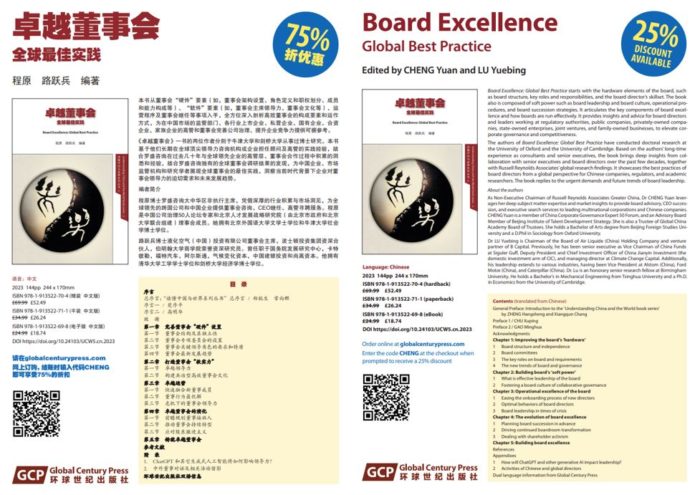
Beyond the Board: Cultivating a Culture of Excellence in Global Governance
Welcome to the official launch page for Board Excellence: Global Best Practice, a groundbreaking work that sets a new standard in corporate governance and board management. Edited by CHENG Yuan and LU Yuebing, and published by Global Century Press, this book is a must-read for board directors, policymakers, and business leaders seeking to navigate the complexities of today’s corporate world. It provides a comprehensive overview of effective board practices, combining research and real-world insights to foster leadership, culture, and strategic planning. Embrace the opportunity to elevate your organization’s governance with this essential guide.
This book is available in Chinese, with the Overseas Chinese edition incorporating select English elements to cater to a wider readership. This practice, a hallmark of Global Century Press, enhances the accessibility of the publication to non-native Chinese speakers or learners of the language. By blending English translations or summaries with the original Chinese text, the publisher not only broadens its market but also facilitates cross-cultural understanding and appreciation. This feature is especially useful for readers interested in Chinese studies, as it allows them to engage with the material more deeply and effectively, regardless of their proficiency in Chinese.
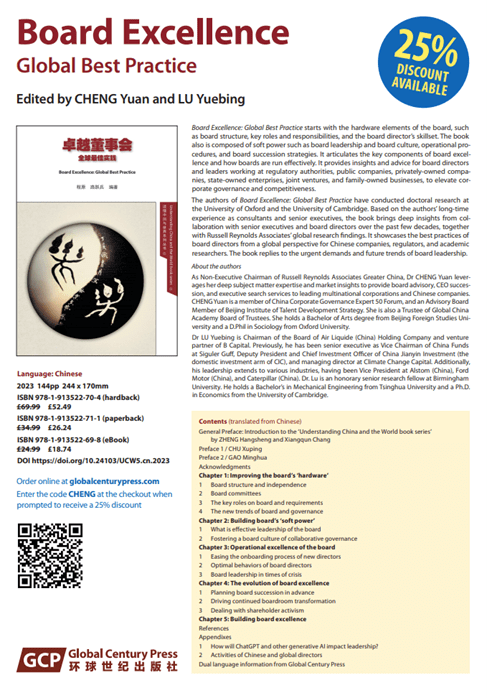
About the book
Board Excellence: Global Best Practice starts with the hardware elements of the board, such as board structure, key roles and responsibilities, and the board director’s skillset. The book also is composed of soft power such as board leadership and board culture, operational procedures, and board succession strategies. It articulates the key components of board excellence and how boards are run effectively. It provides insights and advice for board directors and leaders working at regulatory authorities, public companies, privately-owned companies, stateowned enterprises, joint ventures, and family-owned businesses, to elevate corporate governance and competitiveness.
The authors of Board Excellence: Global Best Practice have conducted doctoral research at the University of Oxford and the University of Cambridge, respectively. Based on the authors’ long-time experience as consultants and senior executives, the book brings deep insights from collaboration with senior executives and board directors over the past few decades, together with Russell Reynolds Associates’ global research findings. It showcases the best practices of board directors from a global perspective for Chinese companies, regulators, and academic researchers. The book replies to the urgent demand and future trends of board leadership.
About the authors
As Non-Executive Chairman of Russell Reynolds Associates Greater China, Dr CHENG Yuan leverages her deep subject matter expertise and market insights to provide board advisory, CEO succession, and executive search services to leading multinational corporations and Chinese companies. CHENG Yuan is a member
of China Corporate Governance Expert 50 Forum, and an Advisory Board Member of Beijing Institute of Talent Development Strategy. She is also a Trustee of Global China Academy Board of Trustees. She holds a Bachelor of Arts degree from Beijing Foreign Studies University and a D.Phil in Sociology from Oxford University.
Dr LU Yuebing is Chairman of the Board of Air Liquide (China) Holding Company and venture partner of B Capital. Previously, he has been senior executive as Vice Chairman of China Funds at Siguler Guff, Deputy President and Chief Investment Officer of China Jianyin Investment (the domestic investment arm of CIC), and managing director at Climate Change Capital. Additionally, his lead rship extends to various industries, having been Vice President at Alstom (China), Ford Motor (China), and Caterpillar (China). Dr. Lu is an honorary senior research fellow at Birmingham University. He holds a Bachelor’s in Mechanical Engineering from Tsinghua University and a Ph.D. in Economics from the University of Cambridge.
Contents
Prefaces
General Preface: Introduction to the ‘Understanding China and the World book series’ by ZHENG Hangsheng and Xiangqun Chang
Preface 1 / CHU Xuping
Preface 2 / GAO Minghua
Acknowledgments
Chapter 1: Improving the board’s ‘hardware’
1.1 Board structure and independence
1.2 Board committees
1.3 The key roles on board and requirements
1.4 The new trends of board and governance
Chapter 2: Building board’s ‘soft power’
2.1 What is effective leadership of the board
2.2 Fostering a board culture of collaborative governance
Chapter 3: Operational excellence of the board
3.1 Easing the onboarding process of new directors
3.2 Optimal behaviors of board directors
3.3 Board leadership in times of crisis
Chapter 4: The evolution of board excellence
4.1 Planning board succession in advance
4.2 Driving continued boardroom transformation
4.3 Dealing with shareholder activism
Chapter 5: Building board excellence
References
Appendixes
1 How will ChatGPT and other generative AI impact leadership?
2 Activities of Chinese and global directors
Dual language information from Global Century Press
1 Abstract and about the author
2 Table of contents
3 About the book series
4 Global Century Press and its unique features
4.1 GCP creates a unique feature for a dual-language service with global and transcultural perspectives
4.2 GCP style rules for rendering Chinese-English dual languages
4.3 GCP style rules for punctuation marks in Chinese and English bilingual typesetting
4.4 GCP style rules for Chinese and related names
5 Other book series and journals published by Global Century Press
As we conclude our introduction to the Board Excellence: Global Best Practice, we highlight its foundational role in shaping the leadership of boards today and in the future. The overseas Chinese edition, published by Global Century Press, features a unique bilingual introduction by the publisher and is slightly updated by the editors from the 2021 Mainland Chinese edition. It offers abundant knowledge and practical strategies for achieving corporate governance excellence. We encourage you to explore its pages to discover the secrets to successful board management. Click on this page now to get your copy and embark on the journey toward effective governance and improving organizational performance.

